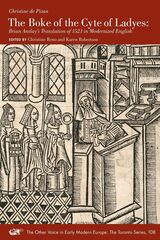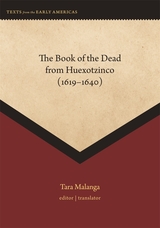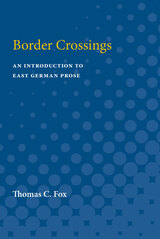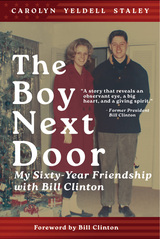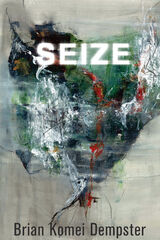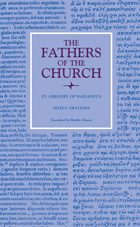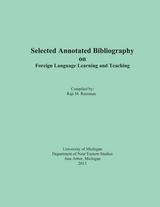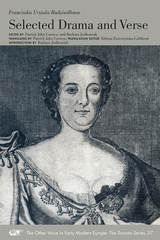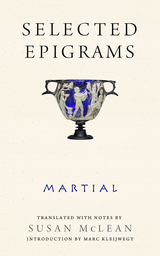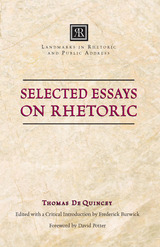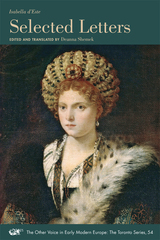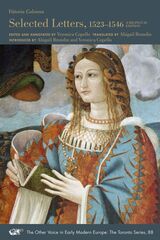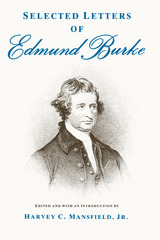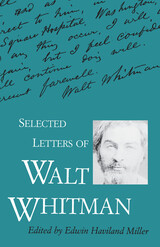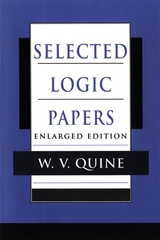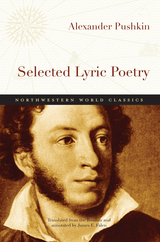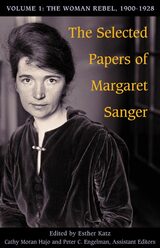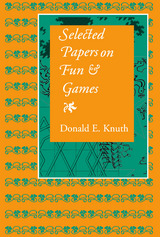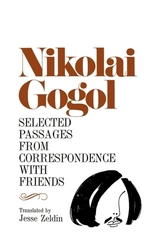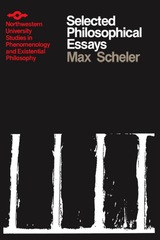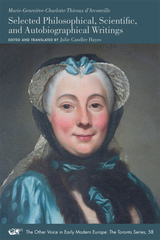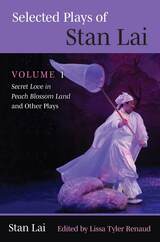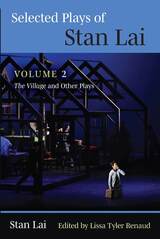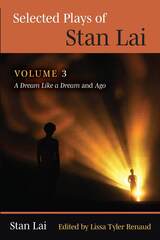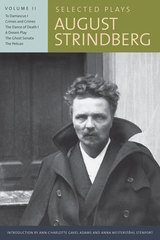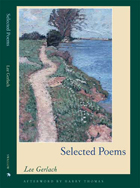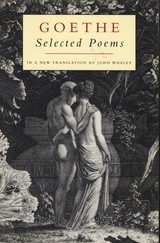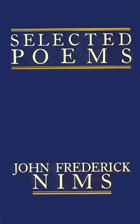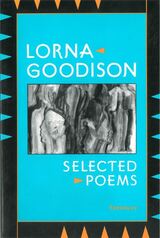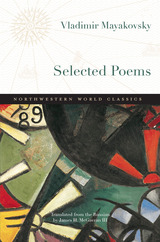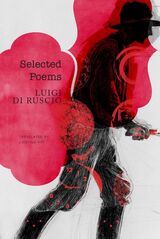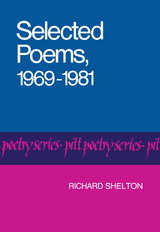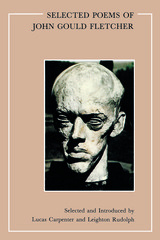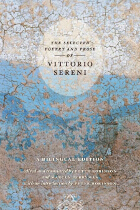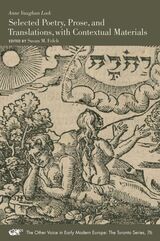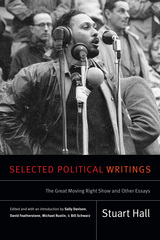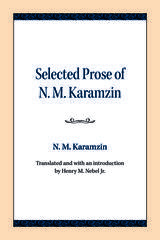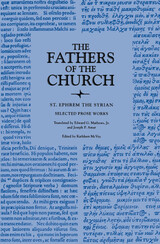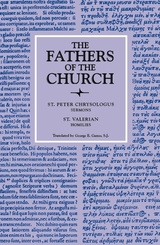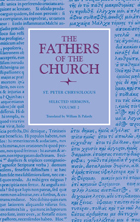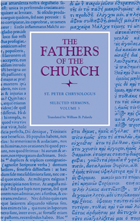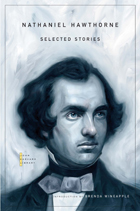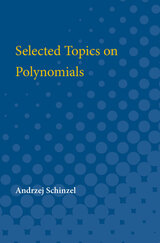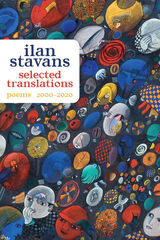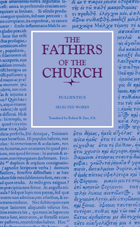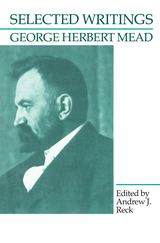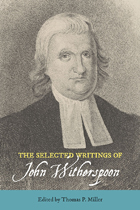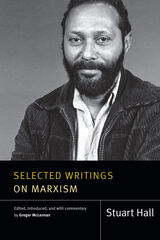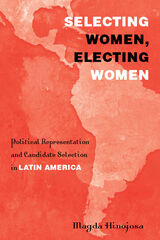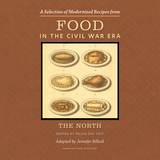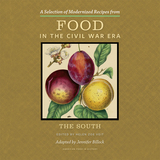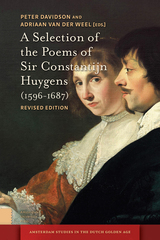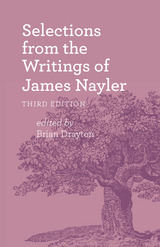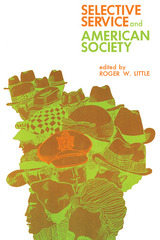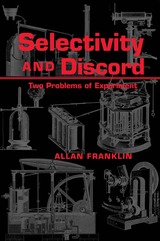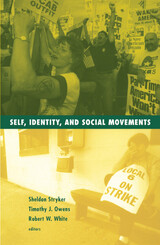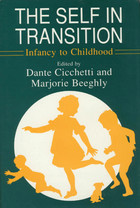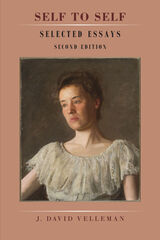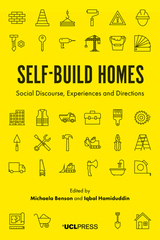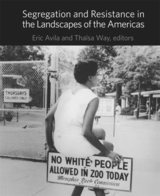 Segregation and Resistance in the Landscapes of the Americas
Eric Avila and Thaïsa Way
Harvard University Press Histories of racial segregation and its impacts have been the focus of urban research for over a century, and yet the role of space, place, and land in these narratives has been largely overlooked. How have land use policies and land access shaped the experience of place? What markings have made evident the lived experience of segregation and its impacts? And how have individuals and communities resisted segregation in their own efforts to make place? With a focus on the Americas, the essays in this volume move across time and space to ask questions about place-making and community building. They explore landscapes and their hidden struggles between segregation and resistance. Drawing upon the collective work of the “Segregation and Resistance in America’s Urban Landscapes” symposium organized by Dumbarton Oaks in 2020, these histories of segregation and resistance consider how cultural and spatial practices of separation, identity, response, and revolt are shaped by place and, in turn, inform practices of place-making.
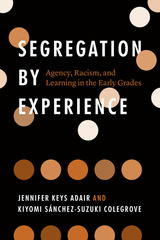 Segregation by Experience: Agency, Racism, and Learning in the Early Grades
Jennifer Keys Adair and Kiyomi Sánchez-Suzuki Colegrove
University of Chicago Press, 2021 A groundbreaking account of how collaborative, expressive learning environments are often denied to children of color
Early childhood can be a time of rich discovery, a period when educators have an opportunity to harness their students’ fascination to create unique learning opportunities. Some teachers engage with their students’ ideas in ways that make learning collaborative--but not all students have access to these kinds of learning environments.
In Segregation by Experience, the authors filmed and studied a a first-grade classroom led by a Black immigrant teacher who encouraged her diverse group of students to exercise their agency. When the researchers showed the film to other schools, everyone struggled. Educators admired the teacher but didn’t think her practices would work with their own Black and brown students. Parents of color—many of them immigrants—liked many of the practices, but worried that they would compromise their children. And the young children who viewed the film thought that the kids in the film were terrible, loud, and badly behaved; they told the authors that learning was supposed to be quiet, still, and obedient. In Segregation by Experience Jennifer Keys Adair and Kiyomi Sánchez-Suzuki Colegrove show us just how much our expectations of children of color affect what and how they learn at school, and they ask us to consider which children get to have sophisticated, dynamic learning experiences at school and which children are denied such experiences because of our continued racist assumptions about them.
 Segregation Games: Boston, Busing, and the Making of Red Sox Nation
David Faflik
University of Massachusetts Press, 2026 A cultural history of race, resistance, and representation in a city divided by politics and play
When outfielder Bernie Carbo joined the Red Sox in 1974, he brought with him a toy gorilla named Mighty Joe Young that became the team’s unofficial mascot for several players and many in the local press. This seemingly innocent stuffed animal was introduced within a baseball team notorious for its stubborn discrimination, and during a particularly fraught era of racial discord in Boston. That June, after years of activism from the city’s Black community, Judge W. Arthur Garrity Jr. ruled that Boston must address the segregation of its schools through redistricting and busing. The ensuing racial animus to these policies led some of the city’s white residents to throw bananas and chant monkey sounds at African American students as they integrated the predominantly white South Boston High School. In this agitated atmosphere, cultural symbols like the Red Sox’s Mighty Joe Young mirrored and amplified the heightened racial tensions of Boston’s busing crisis.
Situated at the intersection of US cultural and social history, Segregation Games examines the surprising ties in 1970s Boston between the racial segregation of the city’s schools and the racial controversies expressed on and off the field of “Red Sox Nation.” “I found out in the black community why they don’t come out [to Fenway Park],” explained Black player Reggie Smith of his experiences with the Red Sox and the city during this period. “The team was the last to get Black players, and some of the things I hear out in the stands make me sick.” To understand these connections, Faflik erases the lines between politics and sport, which routinely blurred in a city suffused with an anti-Black racism that was both deceptively subtle and fiercely overt.
Drawing upon deep archival research from sources that have largely been ignored, such as the Black press of the time, Faflik offers a carefully nuanced portrait of Boston’s cultural life at a pivotal moment in the city’s history.
 Segregation Games: Boston, Busing, and the Making of Red Sox Nation
David Faflik
University of Massachusetts Press, 2026 A cultural history of race, resistance, and representation in a city divided by politics and play
When outfielder Bernie Carbo joined the Red Sox in 1974, he brought with him a toy gorilla named Mighty Joe Young that became the team’s unofficial mascot for several players and many in the local press. This seemingly innocent stuffed animal was introduced within a baseball team notorious for its stubborn discrimination, and during a particularly fraught era of racial discord in Boston. That June, after years of activism from the city’s Black community, Judge W. Arthur Garrity Jr. ruled that Boston must address the segregation of its schools through redistricting and busing. The ensuing racial animus to these policies led some of the city’s white residents to throw bananas and chant monkey sounds at African American students as they integrated the predominantly white South Boston High School. In this agitated atmosphere, cultural symbols like the Red Sox’s Mighty Joe Young mirrored and amplified the heightened racial tensions of Boston’s busing crisis.
Situated at the intersection of US cultural and social history, Segregation Games examines the surprising ties in 1970s Boston between the racial segregation of the city’s schools and the racial controversies expressed on and off the field of “Red Sox Nation.” “I found out in the black community why they don’t come out [to Fenway Park],” explained Black player Reggie Smith of his experiences with the Red Sox and the city during this period. “The team was the last to get Black players, and some of the things I hear out in the stands make me sick.” To understand these connections, Faflik erases the lines between politics and sport, which routinely blurred in a city suffused with an anti-Black racism that was both deceptively subtle and fiercely overt.
Drawing upon deep archival research from sources that have largely been ignored, such as the Black press of the time, Faflik offers a carefully nuanced portrait of Boston’s cultural life at a pivotal moment in the city’s history.
Seize
Brian Komei Dempster
Four Way Books, 2020 Seize, Brian Komei Dempster’s follow-up to Topaz, spares no one the highs and lows of fatherhood. The speaker struggles to care for his young and ailing child — a child whose many medical problems create an obstacle course of moral and emotional dilemmas. How does a father come to terms with the large and unknowable mysteries of a child who cannot communicate in a “normative” way? How does a parent — especially one who is dependent on language — guide a child without the use of speech? And how does one become the parent of another when their own uncertainties, their own wounds — intergenerationally from war, from strained race relations, from constantly being denied a place to belong — are still healing?
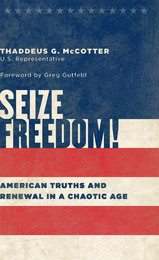 Seize Freedom!: American Truths and Renewal in a Chaotic Age
Thaddeus G. McCotter
Intercollegiate Studies Institute, 2011
“In God’s name, I beg of you to think”
Right now, parents suffer sleepless nights worrying that they will lose their jobs, their homes, and their hopes for their children. Citizens struggle to make sense of an increasingly perverse society disdainful of—and destructive to—the traditional culture of faith, truth, virtue, and beauty. Government—under both parties—has swollen to grotesque proportions, racked up staggering debt, and become a threat to Americans’ freedom.
In the aftermath of a historic election, fueled by citizens willing to stand against a government seemingly aligned against them, U.S. Representative Thaddeus McCotter makes a spirited cry for sanity in a chaotic age. Seize Freedom! boldly confronts the quartet of generational challenges that too many leaders ignore or belittle, and charts the path of truth and renewal for America.
So many of our problems, the author shows, have been exacerbated by ideology, which John Adams aptly called the “science of idiocy.” With incisive thought and wicked humor McCotter attacks the idiocy that pervades Washington. He wisely calls for ridding ourselves of ideology as the first step to transcending our great challenges, which include:
• The social, economic, and political upheavals of globalization: McCotter points the way to a free, prosperous, and humane twenty-first-century economy
• A world war against evil enemies: Seize Freedom! shows why we are engaged not in a War on Terror but in a War for Freedom
• Communist China as a strategic threat: The author explains how the United States must contain this repressive, expansionist regime
• Moral relativism’s erosion of our self-evident truths: McCotter reveals why faith, family, community, and country remain cornerstones of America’s greatness
In ancient Athens, the patriot Demosthenes pleaded with a prideful and pampered people to confront threats to their liberty: “In God’s name, I beg of you to think. The Athenians refused to listen, falling sway to demagogues who dismissed the dangers. Soon their civilization was crushed.
Seize Freedom! is a guide for those concerned citizens and committed conservatives who wish to put an end to the ideologues’ simplistic solutions and false comforts. Well, that, and for anyone who wants a remedy for the usual ghostwritten claptrap that passes for “policy” or “campaign” books. This book won’t make you happier, but it will make you smarter.
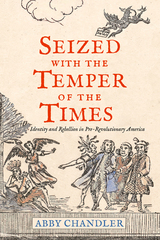 Seized with the Temper of the Times: Identity and Rebellion in Pre-Revolutionary America
Abby Chandler
Westholme Publishing, 2023 “Our personal rights, comprehending those of life, liberty, and estate is every subject’s birthright, whether born in Great Britain or in the colonies” wrote Rhode Island lawyer and politician Martin Howard in a pamphlet defending the Stamp Act. Howard’s opponents drew on a similar fusion of Anglo-American common law and political tradition to voice their own arguments against Parliamentary taxation. Still, such commonalities were not enough to save Howard during Newport’s Stamp Act riots when a mob destroyed his home and forced him to flee to London. Martin was later appointed North Carolina’s Chief Justice, where he played an important role in another crisis, the Regulator Rebellion. The complexities and seeming contradictions that informed the writings of Martin Howard and his colonial counterparts during both the Stamp Act crisis and the Regulator Rebellion bring these understudied movements to vivid life, while also telling a broader story about the evolution of American political thought in the decades surrounding the American Revolution.
In Seized with the Temper of the Times Identity and Rebellion in Pre-Revolutionary America, historian Abby Chandler explores, as never before, the complex local and transatlantic tensions which infused the early imperial crisis. She argues that colonial responses to the Stamp Act were rooted in local tensions and that the Regulator Rebellion was fueled by trans-Atlantic tensions. These two paradoxes, a local crisis cast as imperial affair and an imperial affair cast as local crisis, tell a very different story than the one to which we are accustomed. Without pre-existing local tensions, the fury of the Stamp Act crisis might not have spilled over during the summer of 1765, and, without the added strains of the imperial crisis, the Regulator Rebellion might not have lasted for five years. The questions about the intersecting roles of local and imperial/federal interests and identities raised during both the Stamp Act crisis and the Regulator Rebellion would also continue to inform political thought in Rhode Island and North Carolina in the coming decades. Both colonies had long histories of challenges to their autonomy and their residents embraced the coming revolution before many of their counterparts, but they would also be reluctant participants in the rising union envisioned by the framers of the Constitution.
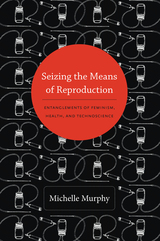 Seizing the Means of Reproduction: Entanglements of Feminism, Health, and Technoscience
M. Murphy
Duke University Press, 2012 In Seizing the Means of Reproduction, M. Murphy's initial focus on the alternative health practices developed by radical feminists in the United States during the 1970s and 1980s opens into a sophisticated analysis of the transnational entanglements of American empire, population control, neoliberalism, and late-twentieth-century feminisms. Murphy concentrates on the technoscientific means—the technologies, practices, protocols, and processes—developed by feminist health activists. They argue that by politicizing the technical details of reproductive health, alternative feminist practices aimed at empowering women were also integral to late-twentieth-century biopolitics. Murphy traces the transnational circulation of cheap, do-it-yourself health interventions, highlighting the uneasy links between economic logics, new forms of racialized governance, U.S. imperialism, family planning, and the rise of NGOs. In the twenty-first century, feminist health projects have followed complex and discomforting itineraries. The practices and ideologies of alternative health projects have found their way into World Bank guidelines, state policies, and commodified research. While the particular moment of U.S. feminism in the shadow of Cold War and postcolonialism has passed, its dynamics continue to inform the ways that health is governed and politicized today.
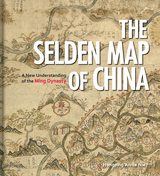 The Selden Map of China: A New Understanding of the Ming Dynasty
Hongping Annie Nie
Bodleian Library Publishing, 2019 Dating from the seventeenth century at the height of the Ming Dynasty, the Selden Map of China reveals a country very different from popular conceptions of the time, looking not inward to the Asian landmass but outward to the sea. Discovered in the stacks of the Bodleian Library, this beautifully decorative map of China is, in fact, a seafaring chart showing Ming Dynasty trade routes. It is the earliest surviving example of Chinese merchant cartography and is evidence that Ming China was outward-looking, capitalistic, and vibrant.
Exploring the commercial aims of the Ming Dynasty, the port city of Quanzhou and its connections with the voyages of the early traveler Zheng He, this book describes the historical background of the era in which the map was used. It also includes an analysis of the skills and techniques involved in Chinese map-making and the significance of the compass bearings, scale, and ratios found on the map, all of which combine to represent a breakthrough in cartographic techniques.
The enthralling story revealed by this extraordinary artifact sheds light on the long history of China’s relationship with the sea and with the wider world.
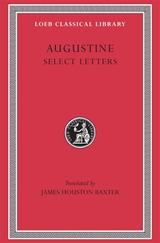 Select Letters
Augustine
Harvard University Press Correspondence of a Church Father.
Aurelius Augustine (AD 354–430), one of the most important figures in the development of western Christianity and philosophy, was the son of a pagan, Patricius of Tagaste, and his Christian wife, Monnica. While studying to become a rhetorician, he plunged into a turmoil of philosophical and psychological doubts, leading him to Manichaeism. In 383 he moved to Rome and then Milan to teach rhetoric. Despite exploring classical philosophical systems, especially skepticism and Neoplatonism, his studies of Paul’s letters with his friend Alypius, and the preaching of Bishop Ambrose, led in 386 to his momentous conversion from mixed beliefs to Christianity. He soon returned to Tagaste and founded a religious community, and in 395 or 396 became bishop of Hippo.
From Augustine’s large output the Loeb Classical Library offers that great autobiography the Confessions (in two volumes); On the City of God (seven volumes), which unfolds God’s action in the progress of the world’s history, and propounds the superiority of Christian beliefs over pagan in adversity; and a selection of Letters which are important for the study of ecclesiastical theologians.
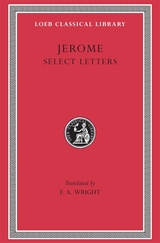 Select Letters
Jerome
Harvard University Press Correspondence of a Church Father.
Jerome (Eusebius Sophronius Hieronymus), ca. 345–420, of Stridon, Dalmatia, son of Christian parents, at Rome listened to rhetoricians, legal advocates, and philosophers, and in 360 was baptized by Pope Liberius. He traveled widely in Gaul and in Asia Minor; and turned in the years 373–379 to hermetic life in Syria. Ordained presbyter at Antioch in 379 he went to Constantinople, met Gregory of Nazianzus and advanced greatly in scholarship. He was called to Rome in 382 to help Pope Damasus, at whose suggestion he began his revision of the Old Latin translation of the Bible (which came to form the core of the Vulgate version). Meanwhile he taught scripture and Hebrew and monastic living to Roman women. Wrongly suspected of luxurious habits, he left Rome (now under Pope Siricius) in 385, toured Palestine, visited Egypt, and then settled in Bethlehem, presiding over a monastery and (with help) translating the Old Testament from Hebrew. About 394 he met Augustine. He died on 30 September 420.
Jerome’s letters constitute one of the most notable collections in Latin literature. They are an essential source for our knowledge of Christian life in the fourth–fifth centuries; they also provide insight into one of the most striking and complex personalities of the time. Seven of the eighteen letters in this selection deal with a primary interest of Jerome’s: the morals and proper role of women. The most famous letter here fervently extols virginity.
Select Orations
Gregory of Nazianzus
Catholic University of America Press, 2003 No description available
 Select Papyri, Volume I: Private Documents
A. S. Hunt
Harvard University Press Personal records from the sands of Egypt.
This is the first of two volumes giving a selection of Greek papyri relating to private and public business. They cover a period from before 300 BC to the eighth century AD. Most were found in rubbish heaps or remains of ancient houses or in tombs in Egypt. From such papyri we get much information about administration and social and economic conditions in Egypt, and about native Egyptian, Greek, Roman, and Byzantine law, as well as glimpses of ordinary life.
This volume contains: Agreements, 71 examples; these concern marriage, divorce, adoption, apprenticeship, sales, leases, employment of laborers. Receipts, 10. Wills, 6. Deed of disownment. Personal letters from men and women, young and old, 82. Memoranda, 2. Invitations, 5. Orders for payment, 2. Agenda, 2. Accounts and inventories, 12. Questions of oracles, 3. Christian prayers, 2. A Gnostic charm. Horoscopes, 2.
The three-volume Loeb Classical Library edition of Select Papyri also includes a volume of poetry.
 Select Papyri, Volume II: Public Documents
A. S. Hunt
Harvard University Press Official records from the sands of Egypt.
This volume presents papyri relating to public business of various kinds in Egypt from the middle of the 3rd century BC to AD 710, thus including affairs in that country first when it was ruled by the Greek Ptolemaic kings, secondly when it was a Roman province. The earliest examples date from the reign of King Ptolemy II Philadelphus and the latest from the government by the Arabs after their conquest of Egypt in AD 639–641.
The papyri chosen were all sent by persons in office (from king, Roman emperor, or governor downwards) or addressed to them or sent for their information: Codes and Regulations, 6 examples. Edicts and Orders, 26. Public Announcements, 6. Reports of Meetings, 3. Official Acts and Inquiries, 5. Judicial Business, 18. Petitions and Applications, 44. Declarations to Officials, 30. Appointments and Nominations, 7. Tenders and Contracts, 19. Receipts, 26. Orders for Payment, 6. Accounts and Registers or Lists, 12. Letters, 16. Notes on the systems of dating and of money in Egypt as well as a glossary of technical terms are provided.
The three-volume Loeb Classical Library edition of Select Papyri also includes a volume of poetry and one of private documents.
 Select Papyri, Volume III: Poetry
Denys L. Page
Harvard University Press Scraps of verse from the sands of Egypt.
The papyri found in Egypt have yielded fragments large and small of ancient literary authors. We include in this volume from the 5th–4th centuries BC fragments of two tragedies (one a satyr play) by Aeschylus; of five by Sophocles; of ten by Euripides; of one by Ion; and of some plays not assignable. From Old Comedy, 5th century, we have fragments of one play each of Epicharmus, Cratinus, Pherecrates, Eupolis, and Plato; some fragments of Aristophanes; and unassignable fragments. From Middle Comedy and New Comedy, 4th and 3rd centuries, are twenty-six items including at least three by Menander and one each by Philemon, Timocles, and Straton. From mimes there are a fragment of Sophron and six unassignable, including 112 lines of clownish doings by the Indian Ocean. The lyric poetry, 7th century BC–4th AD, twenty-one mostly anonymous items, includes some of Sappho, Corinna, Pindar, Philicus, fragments of dithyrambic poetry, hymns, songs and so on. There are seventeen examples of elegiac and iambic, 7th century BC–3rd AD, including some Mimnermus, Amyntas, Leonidas, Antipater of Sidon, and Posidippus. The thirty items of hexameter poetry, 5th century BC–6th AD are mostly unassignable but include Panyasis, Erinna (a lovely fragment of her “Distaff”), Euphorion, Pancrates, and Dionysius (the “Bassarica”).
The three-volume Loeb Classical Library edition of Select Papyri also includes volumes of public and private documents.
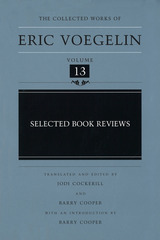 Selected Book Reviews (CW13)
Eric Voegelin, Edited & Translated by Jodi Cockerill and Barry Cooper, & Intro by Jodi Cockerill
University of Missouri Press, 2001 Over the course of his varied and distinguished academic life, Eric Voegelin was often called upon by review editors of scholarly journals as well as by editors in the popular press to examine, summarize, and critically assess the work of other scholars, of statesmen, and of men of affairs. The contents of the books Voegelin reviewed mirror his changing interests over the years, including questions of method, points of legal philosophy and jurisprudence, and issues of race, war, and the aftermath of war. Of course, he was frequently called upon as well to review standard texts and new editions and monographs across the full range of political science. This collection of Voegelin's reviews amounts to a reflection in miniature of many of the problems Voegelin tackled in his essays, articles, and books from the 1920s until the 1950s, when, owing to the press of other business, he began to decline requests to review the work of others. Some of his reviews are little more than clinical summaries; others are analytic essays. A few are extended engagements with a text or a set of problems. Occasionally, particularly among the later reviews originally written in English, one finds flashes of Voegelin's legendary wit and a restrained impatience with the inadequate approaches or sheer incompetence of others. These book reviews will be of interest to all students and scholars of Eric Voegelin's work.
Selected Chinese Texts in the Classical and Colloquial Styles
Lien-sheng Yang
Harvard University Press Photolithographed from original works, well selected texts have been chosen to represent both the classical (wen-yen) and colloquial (pai-hua) styles of the Chinese language. English titles are added in the table of contents to facilitate identification. In every case care has been taken neither to overwhelm nor to spoil the student by improperly graded texts.
Selected Drama and Verse
Franciszka Urszula Radziwillowa
Iter Press, 2015 This edition presents, for the first time in English, a selection from the repertoire of the first Polish woman dramatist, Princess Franciszka Urszula Radziwiłłowa (1705–1753), with a historical-biographical Introduction incorporating interpretations of her works. Radziwiłłowa’s plays treated complex issues concerning intimate relationships. In her poetry she explored new, very personal, means of expression for intimate declarations, in a form of language capable of conveying the emotional distress that could not find expression under existing conventions.
Selected Epigrams
Martial, Translated with notes by Susan McLean, Introduction by Marc Kleijwegt
University of Wisconsin Press, 2014 This lively translation accurately captures the wit and uncensored bawdiness of the epigrams of Martial, who satirized Roman society, both high and low, in the first century CE. His pithy little poems amuse, but also offer vivid insight into the world of patrons and clients, doctors and lawyers, prostitutes, slaves, and social climbers in ancient Rome. The selections cover nearly a third of Martial's 1,500 or so epigrams, augmented by an introduction by historian Marc Kleijwegt and informative notes on literary allusion and wordplay by translator Susan McLean.
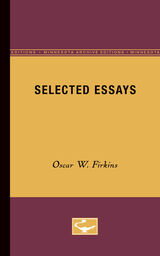 Selected Essays
Oscar W. Firkins
University of Minnesota Press, 1933
Selected Essays was first published in 1933. Minnesota Archive Editions uses digital technology to make long-unavailable books once again accessible, and are published unaltered from the original University of Minnesota Press editions.
Professor Firkins' reputation as a writer whose work combines the qualities of thought and style, of penetrating criticism and epigrammatic wit, is amply upheld by these seventeen essays.
The volume opens with "Man: A Character Sketch," which Christopher Morley has described as a "brilliant essay in spiritual anthropology." Emerson and Howells, on both of whom Mr. Firkins was a recognized authority, are each the subject of an essay. Glimpses of the author's boyhood and of his remarkable mother are given in "Undepicted America," which is the development of an original theory concerning American letters. In "The Irresponsible Power of Realism" the author flays some modern tendencies in literature and in "The Sermon on the Mount" he sets forth the basic principles of his humanistic religious views.
A few of these essays are here published for the first time. Most of them, however, have been selected as representative of Mr. Firkins' best published work in the field of the critical essay.
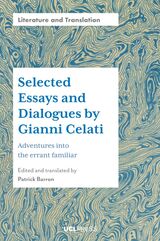 Selected Essays and Dialogues by Gianni Celati: Adventures into the Errant Familiar
Edited and Translated by Patrick Barron
University College London, 2024 The first English-language collection of critical essays by Gianni Celati, one of Italy’s most important contemporary authors.
Selected Essays and Dialogues is a collection of translations of Italian essayist Gianni Celati’s theoretical and musing work from the late 1960s to the present. Its topics range from environmental perception and archaeological conceptions of historical knowledge to street theater, writing, photography, cinema, and translation. The book provides a framework of key literary, theoretical, and artistic movements of the past fifty years, as well as a guide for English-language readers to place Celati’s work in historical, cultural, and biographical contexts.
Celati’s fondness for the unexpected ordinary tempts readers to wander and become lost in the webs of his daring thoughts. Indeed, a genial adventurousness can be found within all of his writings collected here, driven by an affectionate and light-hearted engagement with the surrounding world. This collection offers a taste of his adventures of the mind and body, led by a lithe sensitivity not restricted to the so-called high arts or letters, but also very much engaged with the everyday lives, places, and tales we all constantly share.
 Selected Essays by Frank H. Knight, Volume 1: "What is Truth" in Economics?
Frank H. Knight
University of Chicago Press, 2000 Frank H. Knight (1885-1972) was a central figure—many say the dominant influence—in the development of the "Chicago School of Economics" at the University of Chicago in the 1930s and 1940s, where he taught future Nobel laureates Milton Friedman, James Buchanan, George Stigler, and many other notable scholars. It was Knight's embedded skepticism about the reach of economic knowledge that set the stage for the laissez-faire economics that matured at the University in the 1950s and 1960s. But as important as Knight's technical economic contributions were, he never strayed far from his broad philosophical interests and concern for the state of modern liberal democracy.
Ross B. Emmett's selection of Knight's essays is the first to offer a comprehensive picture of the work of this notable social scientist over the span of his career. Included are not only Knight's most influential writings, but also a number of uncollected papers which have not previously been widely accessible. These essays illustrate Knight's views on the central debates regarding economics, social science, ethics, education, and modern liberalism. Volume 1: "What is Truth" in Economics? contains fifteen of Knight's papers up through 1940. Volume 2: Laissez Faire: Pro and Con includes fourteen of Knight's papers from 1940 through 1967, including "Socialism: The Nature of the Problem" and "The Sickness of Liberal Society."
These twenty-nine essays together stand not only as a monument to one of economics' most significant and original thinkers, but will also serve as an invaluable resource for economists, philosophers, and political scientists interested in the development of the western liberal tradition.
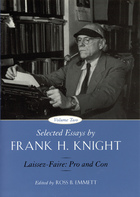 Selected Essays by Frank H. Knight, Volume 2: Laissez Faire: Pro and Con
Frank H. Knight
University of Chicago Press, 2000 Frank H. Knight (1885-1972) was a central figure—many say the dominant influence—in the development of the "Chicago School of Economics" at the University of Chicago in the 1930s and 1940s, where he taught future Nobel laureates Milton Friedman, James Buchanan, George Stigler, and many other notable scholars. It was Knight's embedded skepticism about the reach of economic knowledge that set the stage for the laissez-faire economics that matured at the University in the 1950s and 1960s. But as important as Knight's technical economic contributions were, he never strayed far from his broad philosophical interests and concern for the state of modern liberal democracy.
Ross B. Emmett's selection of Knight's essays is the first to offer a comprehensive picture of the work of this notable social scientist over the span of his career. Included are not only Knight's most influential writings, but also a number of uncollected papers which have not previously been widely accessible. These essays illustrate Knight's views on the central debates regarding economics, social science, ethics, education, and modern liberalism. Volume 1: "What is Truth" in Economics? contains fifteen of Knight's papers up through 1940. Volume 2: Laissez Faire: Pro and Con includes fourteen of Knight's papers from 1940 through 1967, including "Socialism: The Nature of the Problem" and "The Sickness of Liberal Society."
These twenty-nine essays together stand not only as a monument to one of economics' most significant and original thinkers, but will also serve as an invaluable resource for economists, philosophers, and political scientists interested in the development of the western liberal tradition.
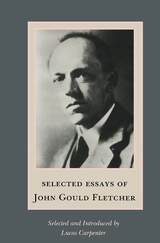 Selected Essays of John Gould Fletcher
John Fletcher
University of Arkansas Press, 1989 ike most of his contemporaries, poet John Gould Fletcher was drawn to criticism because of the opportunity it presented to express his own deeply held philosophical beliefs. Critical journalism also offered Fletcher a chance to make his living as a man of letters. Selected Essays of John Gould Fletcher brings together for the first time a representative selection from Fletcher’s voluminous critical writings. Ranging in subject from Modernist poetics to Asian art, these essays reveal a keen, insightful intellect coming to grips with the central artistic problems of the most revolutionary period in modern literature, painting, music, and philosophy. First published in Poetry, North American Review, Southern Review, and Criterion, and other leading cultural journals of their day, Fletcher’s essays are arranged in three groups: poetry and poetics; appreciation of individual writers; and essays on art and philosophy. Significant and long overdue both in terms of the light it sheds on Fletcher and the evolution of the Modernist movement, the collection should challenge all serious students of literature and general readers alike.
Selected Essays on Rhetoric
Thomas De Quincey, Edited with a Critical Introduction by Frederick Burwick. Foreword by David Potter
Southern Illinois University Press, 1967 The five essays presented here—Rhetoric, Style, Language, Conversation, and Greek Literature—were published together for the first time in The Collected Writings of Thomas De Quincey in 1889–1890. Frederick Burwick brings the essays together again in this volume, introducing them by tracing the sources and development of a belletristic theory of rhetoric, which he says “is one of the most original, and for a few critics, the most puzzling of the nineteenth century.” Burwick makes the edition complete with a comprehensive index and a selected bibliography.
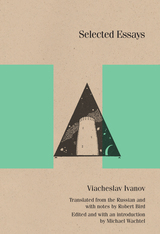 Selected Essays: Viacheslav Ivanov
Viacheslav Ivanov
Northwestern University Press, 2003 Winner of 2002 AATSEEL Award for Best Translation into English
A poet, critic, and theoretician during the Silver Age of Russian poetry, at the turn of the twentieth century, Viacheslav Ivanov was dubbed "Viacheslav the Magnificent" by his contemporaries for his erudition, sumptuous and allusive poetry, and brilliant essays. He provided Russian Symbolism with theoretical underpinnings based on classical and biblical mythology, the aesthetics of music, philosophy ranging from Plato and Kant to Schopenhauer and Nietzsche, and a profound knowledge of classical and modern European poetry.
In choosing material for this volume of essays, Robert Bird and Michael Wachtel have covered a broad range of Ivanov's interests: the aesthetics of Symbolism, theater, culturological concerns, and on such influential figures of the period as Nietzsche, Solovyov, Tolstoy, and Scriabin. Also included are extensive notes on the essays in which classical, biblical, and poetic citations and allusions are identified, the aesthetic and theoretical contexts are clarified, and certain translation problems are briefly discussed. This volume provides valuable insight into the theory of Symbolism as it developed in Russia.
 Selected Ghazals and Other Poems
Mir Taqi Mir
Harvard University Press, 2019 The finest ghazals of Mir Taqi Mir, the most accomplished of Urdu poets.
Mir Muhammad Taqi Mir (1723–1810) is widely regarded as the most accomplished poet in the Urdu language. His massive output—six divans—was produced in Delhi and Lucknow during the high tide of Urdu literary culture.
Selected Ghazals and Other Poems offers a comprehensive collection of Mir’s finest ghazals, extended lyrics composed of couplets, and of his masnavis, narrative works of a romantic or didactic character. The ghazals celebrate earthly and mystical love through subtle wordplay, vivid descriptions of the beloved, and a powerful individual voice. The sometimes satirical masnavis highlight everyday subjects: domestic pets, monsoon rains, the rigors of travel. They also include two astonishing love stories: one about young men whose relationship is shattered when one marries; the other about a queen, her peacock lover, and the jealous king who seeks to drive them apart.
The Urdu text, presented here in the Nastaliq script, accompanies new translations of Mir’s poems, some appearing in English for the first time.
Selected Letters
Isabella d’Este
Iter Press, 2017 Isabella d’Este (1474–1539), daughter of the Este dukes of Ferrara and wife of Marchese Francesco II Gonzaga of Mantua, co-regent of the Gonzaga state, art collector, musician, diplomat, dynastic mother, traveler, reader, gardener, fashion innovator, and consummate politician, was also, as this volume attests, a prolific letter writer with a highly developed epistolary network. Presented here for the first time in any language is a representative selection from over 16,000 letters sent by Isabella to addressees across a wide social spectrum. Together, they paint a nuanced and colorful portrait of a brilliant and influential female protagonist of early modern European society.
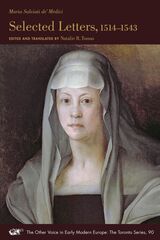 Selected Letters, 1514-1543
Maria Salviati de’ Medici
Iter Press, 2022 The voluminous correspondence of Maria Salviati de’ Medici.
In recent years, there has been an upsurge of interest in Maria Salviati de’ Medici, specifically, in her role in Medici governance and her relationships with other members of the Medici court. Maria Salviati’s surviving correspondence documents a life spent close to the centers of Medici power in Florence and Rome, giving witness to its failures, resurrection, and eventual triumph. Presented here for the first time in English, this book is a representative sample of Maria’s surviving letters that document her remarkable life through a tumultuous period of Italian Renaissance history. While she earned the exasperation of some, she gained the respect of many more. Maria ended her life as an influential dowager, powerful intercessor for local Tuscans of all strata, and wise elder in Duke Cosimo I’s court. The first critical, analytical, biographical work on Maria Salviati de’ Medici’s life and letter-writing in English.
Selected Letters, 1523-1546: A Bilingual Edition
Vittoria Colonna
Iter Press, 2022 Forty revealing personal letters written by a key figure from the Italian Renaissance.
The most celebrated woman writer of the Italian Renaissance, Vittoria Colonna was known for her elegant poetry and use of the sonnet form to explore pressing religious questions. The selection of Colonna’s letters presented here for the first time in a collected edition was written to and from writers, artists, popes, cardinals, employees, and family members. Together they place Colonna at the center of intersecting epistolary networks as a political actor, theological thinker, literary practitioner, and caring friend. Revealing a historical woman speaking and acting with force in the world, these letters constitute a vital tool for anyone seeking to understand Colonna’s literary works. Newly translated, this work reveals new aspects and faces of the most celebrated woman writer of the Italian Renaissance.
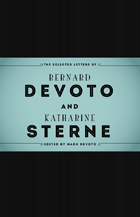 The Selected Letters of Bernard DeVoto and Katharine Sterne
Mark DeVoto
University of Utah Press, 2012 Bernard DeVoto (1897–1955) was a historian, critic, editor, professor, political commentator, and conservationist, and above all a writer of comprehensive skill. As a contributor for more than thirty years to Harper’s and other magazines, he was known for his forceful opinions. His essays were often brash and opinionated and kept him in the public limelight. One stinging essay even led the FBI to create a file on him. His five serious novels are forgotten today, but his magazine short stories and the well-paid potboilers that he wrote under a pseudonym (John August) subsidized the first of the significant works of American history that brought DeVoto lasting fame. Four of his historical works, all still in print, are The Year of Decision: 1846, a Book-of-the-Month Club selection in 1943; Across the Wide Missouri, which won the Pulitzer Prize in history in 1948; 1953 National Book Award–winning The Course of Empire; and his popular abridged edition of the Journals of Lewis and Clark, which also appeared in 1953.
A busy man with a busy life, DeVoto found time to write and answer letters in abundance. In 1933 he received a fan letter from Katharine Sterne, a young woman hospitalized with tuberculosis; his reply touched off an extraordinary eleven-year correspondence. Sterne had graduated with honors from Wellesley College in 1928 and had served as an assistant art critic at the New York Times before her illness. Despite her enforced invalidism she maintained an active intellectual life. Sterne and DeVoto wrote to each other until her death in 1944, sometimes in many pages and as often as twice a week, exchanging opinions about life, literature, art, current events, family news, gossip, and their innermost feelings. DeVoto’s biographer, Wallace Stegner, states that in these letters DeVoto “expressed himself more intimately than in any other writings.” Although their correspondence amounted to more than 868 letters (and is virtually complete on both sides), DeVoto and Sterne never met, both of them doubtless realizing that physical remoteness permitted a psychological proximity that was deeply nourishing.
This volume contains 140 of their letters. They have been selected by DeVoto’s son Mark, who has also provided detailed notes clarifying ambiguities and obscure references. Readers will enjoy these letters for their wit and literary flair, but they will also gain insight into the cultural and historical crosscurrents of the 1930s and ’40s while taking an intimate and engaging look at a friendship forged entirely through words.
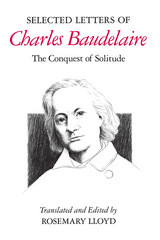 Selected Letters of Charles Baudelaire: The Conquest of Solitude
Charles Baudelaire
University of Chicago Press, 1986 Undeniably one of the modern world's greatest literary figures, Charles Baudelaire (1821-67) left behind a correspondence documenting in intimate detail a life as intense in its extremes as his poetry. This extensive selection of his letters—many translated for the first time into English—depicts a poet divided between despair and elation, thoughts of suicide and intimations of immortality; a man who could write to his mother, "We're obviously destined to love one another, to end our lives as honestly and gently as possible," and say in the next sentence, "I'm convinced that one of us will kill the other"; who courted and then suffered the controversy provoked by his masterpiece, Les Fleurs du mal; who struggled throughout his life with syphilis contracted in his youth, near-intolerable financial restrictions imposed by his stepfather, and conflicting feelings of failure and revolt dating from his school days.
Writing to family, friends, and lovers, Baudelaire reveals the incidents and passions that went into his poetry. In letters to editors, idols, and peers—Hugo, Flaubert, Vigny, Wagner, Cladel, among others—he elucidates the methods and concerns of his own art and criticism and comments tellingly on the arts and politics of his day. In all, ranging from childhood to days shortly before his death, these letters comprise a complex and moving portrait of the quintessential poet and his time.
Selected Letters of Edmund Burke
Edmund Burke
University of Chicago Press, 1984 Edmund Burke (1729-97) was a British statesman, a political philosopher, a literary critic, the grandfather of modern conservatism, and an elegant, prolific letter writer and prose stylist. His most important letters, filled with sparkling prose and profound insights, are gathered here for the first time in one volume. Arranged topically, the letters bring alive Burke's passionate views on such issues as party politics, reform and revolution, British relations with America, India, and Ireland, toleration and religion, and literary and philosophical concerns.
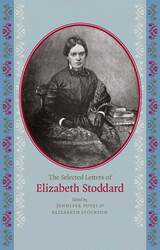 The Selected Letters of Elizabeth Stoddard
Jennifer Putzi
University of Iowa Press, 2012 In response to the resurgence of interest in American novelist, poet, short-story writer, and newspaper correspondent Elizabeth Stoddard (1823–1902), whose best-known work is The Morgesons (1862), Jennifer Putzi and Elizabeth Stockton spent years locating, reading, and sorting through more than 700 letters scattered across eighteen different archives, finally choosing eighty-four letters to annotate and include in this collection. By presenting complete, annotated transcripts, The Selected Letters provides a fascinating introduction to this compelling writer, while at the same time complicating earlier representations of her as either a literary handmaiden to her at-the-time more famous husband, the poet Richard Henry Stoddard, or worse, as the “Pythoness” whose difficult personality made her a fickle and unreasonable friend. The Stoddards belonged to New York's vibrant, close-knit literary and artistic circles. Among their correspondents were both family members and friends including writers and editors such as Julia Caroline Ripley Dorr, Rufus Griswold, James Russell Lowell, Caroline Healey Dall, Julian Hawthorne, William Dean Howells, Helen Hunt Jackson, Edmund Clarence Stedman, and Margaret Sweat. An innovative and unique writer, Stoddard eschewed the popular sentimentality of her time even while exploring the emotional territory of relations between the sexes. Her writing—in both her published fiction and her personal letters—is surprisingly modern and psychologically dense. The letters are highly readable, lively, and revealing, even to readers who know little of her literary output or her life. As scholars of epistolarity have recently argued, letters provide more than just a biographical narrative; they also should be understood as aesthetic performances themselves. The correspondence provides a sense of Stoddard as someone who understood letter writing as a distinct and important literary genre, making this collection particularly well suited for new conceptualizations of the epistolary genre.
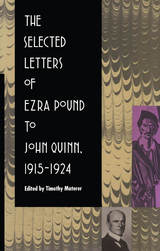 The Selected Letters of Ezra Pound to John Quinn: 1915–1924
Timothy Materer, ed.
Duke University Press, 1991 This volume provides a first-hand survey of the arts and literature during a crucial period in modern culture, 1915–1924. Pound was then associated with such germinal magazines as BLAST, The Little Review, The Egoist, and Poetry; he was discovering or publicizing writers such as Robert Frost, Hilda Doolittle, T. S. Eliot, and James Joyce; and he was championing the painters Wyndham Lewis and William Wadsworth as well as the sculptors Jacob Epstein, Henri Gaudier-Brzeska, and Constantin Brancusi.
Pound wrote to John Quinn—a New York lawyer, an expert in business law, and a collector of unusual taste and discrimination—about these artists and many more, urging him to support their journals, collect their manuscripts, and buy and exhibit their paintings and sculptures. Quinn at one time owned manuscripts of Ulysses and The Waste Land, Brancusi’s sculpture Mlle. Pogany, and Picasso’s painting Three Musicians. Yet he was often skeptical about the value of new schools of art, such as Vorticism, and disturbed by the outspokenness of authors such as Joyce. Pound’s letters are unusually tactful when he counters Quinn’s doubts and explains the premises of experimental art. Pound’s letters to Quinn are touched with his characteristic humor and wordplay and are especially notable for their lucidity of expression, engendered by Pound’s deep respect for Quinn.
 The Selected Letters of George Oppen
Rachel Blau DuPlessis, ed.
Duke University Press, 1990 Objectivist poet George Oppen (1908–1984), along with his contemporaries Lorine Niedecker, Charles Reznikoff, and Carl Rakoski, provide an important bridge between the vanguard modernist American poets and the later works of poets such as Robert Creeley. In work often compounded by the populist urbanity of city lives, the Objectivists explored the social statements poetry can make. Because Oppen wrote only one essay and one essay-review, his correspondence, in effect, constitutes his essays. Oppen is emerging as one of the major poets of the postwar era; he was the recipient of an American Academy and Institute of Arts and Letters Award, the PEN/West Rediscovery Award, and a Senior Fellowship from the National Endowment for the Arts. His collection Of Being Numerous received the 1969 Pulitzer Prize for Poetry.
These working papers include a rich correspondence, letters which provide access to the sustained, perceptive body of critical and aesthetic thinking of Oppen’s poetic career. Provocative and witty comments on poetry and poetics, especially interesting for the development of an Objectivist aesthetics, and shrewd, deeply felt assessments about the politics of the twentieth century and its moral dilemmas are some of the issues attended to. This edition offers primary documentation about an influential poetics, a little-known movement, and its active figures. Given the aggressive studies of the politics of canon-formation, the interest in describing a historical context for individual literary achievement, and current debates about mainstream poetry, the rethinking of the Objectivist movement, and the collection of documents contributing to its poetics, is an important achievement in literary scholarship.
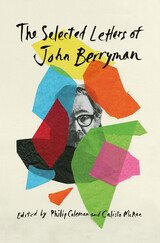 The Selected Letters of John Berryman
John Berryman
Harvard University Press, 2020 A wide-ranging, first-of-its-kind selection of Berryman’s correspondence with friends, loved ones, writers, and editors, showcasing the turbulent, fascinating life and mind of one of America’s major poets.
The Selected Letters of John Berryman assembles for the first time the poet’s voluminous correspondence. Beginning with a letter to his parents in 1925 and concluding with a letter sent a few weeks before his death in 1972, Berryman tells his story in his own words.
Included are more than 600 letters to almost 200 people—editors, family members, students, colleagues, and friends. The exchanges reveal the scope of Berryman’s ambitions, as well as the challenges of practicing his art within the confines of the publishing industry and contemporary critical expectations. Correspondence with Ezra Pound, Robert Lowell, Delmore Schwartz, Adrienne Rich, Saul Bellow, and other writers demonstrates Berryman’s sustained involvement in the development of literary culture in the postwar United States. We also see Berryman responding in detail to the work of writers such as Carolyn Kizer and William Meredith and encouraging the next generation—Edward Hoagland, Valerie Trueblood, and others. The letters show Berryman to be an energetic and generous interlocutor, but they also make plain his struggles with personal and familial trauma, at every stage of his career.
An introduction by editors Philip Coleman and Calista McRae explains the careful selection of letters and contextualizes the materials within Berryman’s career. Reinforcing the critical and creative interconnectedness of Berryman’s work and personal life, The Selected Letters confirms his place as one of the most original voices of his generation and opens new horizons for appreciating and interpreting his poems.
 Selected Letters of John Keats: Based on the texts of Hyder Edward Rollins, Revised Edition
John KeatsEdited by Grant F. Scott
Harvard University Press, 2005 The letters of John Keats are, T. S. Eliot remarked, "what letters ought to be; the fine things come in unexpectedly, neither introduced nor shown out, but between trifle and trifle." This new edition, which features four rediscovered letters, three of which are being published here for the first time, affords readers the pleasure of the poet's "trifles" as well as the surprise of his most famous ideas emerging unpredictably.
Unlike other editions, this selection includes letters to Keats and among his friends, lending greater perspective to an epistolary portrait of the poet. It also offers a revealing look at his "posthumous existence," the period of Keats's illness in Italy, painstakingly recorded in a series of moving letters by Keats's deathbed companion, Joseph Severn. Other letters by Dr. James Clark, Percy Bysshe Shelley, and Richard Woodhouse--omitted from other selections of Keats's letters--offer valuable additional testimony concerning Keats the man.
Edited for greater readability, with annotations reduced and punctuation and spelling judiciously modernized, this selection recreates the spontaneity with which these letters were originally written.
 The Selected Letters of Juanita Brooks
Edited by Craig S. Smith
University of Utah Press, 2019 The 220 letters selected for this book offer a fresh and intimate encounter with Juanita Brooks, one of the most influential historians of Utah and the Mormons. Born and raised in the small and remote agricultural village of Bunkerville, Nevada, Brooks lived most most of her life in St. George, Utah, and rose to prominence following the 1950 publication of her landmark book, The Mountain Meadows Massacre. Her unwavering commitment to honest scholarship continues to inspire younger generations laboring to produce excellent objective history.
The letters in this volume, written from 1941 to 1978, trace Brooks’s development from fledgling historian to recognized authority. Serving almost as an autobiography of her interactions with her contemporaries, this selection provides a new perspective on Brooks’s personality and growth as a scholar. Richly detailed, chatty, and covering a wide array of subjects, the letters afford an important glimpse into Brooks’s struggles, concerns, and interests.
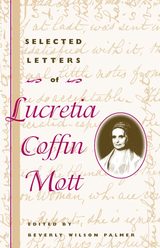 Selected Letters of Lucretia Coffin Mott
Lucretia Coffin Mott. Edited by Beverly Wilson Palmer: With the Assistance of Holly Byers Ochoa, Associate Editor, and Carol Faulkner, Editing Fellow
University of Illinois Press, 2002 This landmark volume collects Lucretia Mott's correspondence for the first time, highlighting the length and breadth of her work as an activist dedicated to reform of almost every kind and providing an intimate glimpse of her family life. Mott’s achievements left a mark on reform movements from abolition to women's rights. The letters cover her work in these causes as well as her founding of key antislavery organizations; her friendships with Harriet Tubman and Sojourner Truth; her efforts to bring Quakers into the abolitionist movement; and her part in organizing the 1848 Seneca Falls Woman's Rights Convention. Other correspondence cover her fifty-six-year marriage, the five children she raised to adulthood, and informal insights and news with and about her cherished family. An invaluable resource, Selected Letters of Lucretia Coffin Mott reveals the incisive mind, sense of mission, and level-headed personality that made this extraordinary figure a major force in nineteenth-century American life.
Selected Letters of Stéphane Mallarmé
Stéphane Mallarmé
University of Chicago Press, 1988 It is the reading world's good fortune that Stéphane Mallarmé's letters survived, allowing later generations an intimate look at the inner life of one of Europe's most important poets. Mallarmé (1842-98), often called the father of the Symbolists, has had an immense influence on the development of modern European poetry. It was his ambition to create a poetry pure of quotidian reality—autonomous, concentrated, linguistically inventive. His correspondence documents the evolution of this aim, the crafting of a poetics out of a life inescapably "real" in its pains and charms.
Selected Letters of Walt Whitman
Edwin Haviland Miller
University of Iowa Press, 1990 There has never been an edition of the selected letters of Walt Whitman, a remarkable fact considering how accustomed we are to becoming acquainted with major writers through their letters. Now Edwin Haviland Miller, editor of the six-volume collected writings of Whitman, has used his intimate knowledge of the "good gray poet's" correspondence to produce this revealing selection of 250 letters, introduced and annotated concisely and evocatively. Whitman in these letters is simple, direct, colloquial, adding a counterpoint to his artistic voice and persona as a poet.
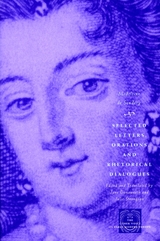 Selected Letters, Orations, and Rhetorical Dialogues
Madeleine de Scudery
University of Chicago Press, 2004 Madeleine de Scudéry (1607-1701) was the most popular novelist in her time, read in French in volume installments all over Europe and translated into English, German, Italian, and even Arabic. But she was also a charismatic figure in French salon culture, a woman who supported herself through her writing and defended women's education. She was the first woman to be honored by the French Academy, and she earned a pension from Louis XIV for her writing.
Selected Letters, Orations, and Rhetorical Dialogues is a careful selection of Scudéry's shorter writings, emphasizing her abilities as a rhetorical theorist, orator, essayist, and letter writer. It provides the first English translations of some of Scudéry's Amorous Letters, only recently identified as her work, as well as selections from her Famous Women, or Heroic Speeches, and her series of Conversations. The book will be of great interest to scholars of the history of rhetoric, French literature, and women's studies.
 Selected Letters, Volume 1
Francesco Petrarca
Harvard University Press, 2017 Francesco Petrarca (1304–1374), one of the greatest of Italian poets, was also the leading spirit in the Renaissance movement to revive the cultural and moral excellence of ancient Greece and Rome. This two-volume set contains an ample, representative sample from his enormous and fascinating correspondence with all the leading figures of his day, from popes, emperors, and kings to younger contemporaries such as Cola di Rienzi and Giovanni Boccaccio. The letters illustrate the remarkable story of Petrarca’s life in a Europe beset by war, plague, clerical corruption, and political disintegration. The ninety-seven letters in this selection, all freshly translated, cover the full range of Petrarca’s interests, including the rediscovery of lost classical texts, the reform of the Church, the ideal prince, education in the classics, and the revival of ancient moral philosophy. They include Petrarca’s imaginary correspondence with the ancient authors he loved so well, and his autobiographical Letter to Posterity.
 Selected Letters, Volume 2
Francesco Petrarca
Harvard University Press, 2017 Francesco Petrarca (1304–1374), one of the greatest of Italian poets, was also the leading spirit in the Renaissance movement to revive the cultural and moral excellence of ancient Greece and Rome. This two-volume set contains an ample, representative sample from his enormous and fascinating correspondence with all the leading figures of his day, from popes, emperors, and kings to younger contemporaries such as Cola di Rienzi and Giovanni Boccaccio. The letters illustrate the remarkable story of Petrarca’s life in a Europe beset by war, plague, clerical corruption, and political disintegration. The ninety-seven letters in this selection, all freshly translated, cover the full range of Petrarca’s interests, including the rediscovery of lost classical texts, the reform of the Church, the ideal prince, education in the classics, and the revival of ancient moral philosophy. They include Petrarca’s imaginary correspondence with the ancient authors he loved so well, and his autobiographical Letter to Posterity.
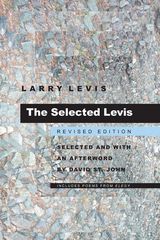 The Selected Levis: Revised Edition
Larry Levis
University of Pittsburgh Press, 2003 Edited and with an Afterword by David St. John
When Larry Levis died suddenly in 1996, Philip Levine wrote that he had years earlier recognized Levis as “the most gifted and determined young poet I have ever had the good fortune to have in one of my classes. . . . His early death is a staggering loss for our poetry, but what he left is a major achievement that will enrich our lives.” Each of his books was published to wide critical acclaim, and David St. John has collected together the best of his work from his first five books: Wrecking Crew (1972), Afterlife (1976), The Dollmaker’s Ghost (1981), Winter Stars (1985) and The Widening Spell of the Leaves (1991).
“It is not an exaggeration to say that the death of Larry Levis in 1996—of a heart attack at 49—sent a shock wave through the ranks of American poetry. Not only was Levis a good friend to many poets (not simply of his own generation but of many poets older and younger as well), his poetry had become a kind of touchstone for many of us, a source of special inspiration and awe. With Larry Levis’ death came the sense that an American original had been lost. . . . It is not at all paradoxical that he saw both the most intimate expressions of poetry and the grandest gestures of art, of language, as constituting individual acts of courage. One can only hope that, like such courage, Larry Levis’s remarkable poems will continue to live far into our literature.”—from the Afterword, by David St. John
 A Selected List of Books and Articles on Japan in English, French, and German: Revised and Enlarged Edition
Hugh Borton
Harvard University Press This revised and enlarged edition of A Selected List of Books and Articles on Japan in English, French, and German, first published in 1940, contains more than seventeen hundred titles which have been carefully chosen to guide the general reader and to aid the serious student of Japanese civilization in his research. Certain items included in the first edition have been eliminated, and hundreds of new entries, including material published during and after World War II, have been added. The list is divided into section which deal with bibliography, geography, history, political and social sciences, religion and philosophy, language, literature, art, et cetera. Subdivision of these sections facilitates the search for books and articles on a particular subject. The entries are arranged alphabetically by author and are individually numbered. An author, title, and subject index also contributes to the usefulness of the book.
There is no other convenient selected list of this sort on Japan. Scholars, journalists, government personnel, and other who wish to obtain information concerning books and articles on Japan will find this book an invaluable guide.
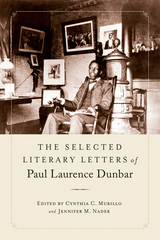 The Selected Literary Letters of Paul Laurence Dunbar
Edited by Cynthia C. Murillo and Jennifer M. Nader
University of Alabama Press, 2021 These 250 transcribed and annotated letters reveal the personal and literary life of one of the most highly regarded African American writers and intellectuals
Paul Laurence Dunbar (1873–1906) was arguably the most famous African American poet, novelist, and dramatist at the turn of the twentieth century and one of the earliest African American writers to receive national recognition and appreciation. Scholars have taken a renewed interest in Dunbar but much is still unknown about this once-famous African American author’s life and literary efforts. Dunbar’s letters to various editors, friends, benefactors, scholars, and family members are crucial to any critical or theoretical understanding of his journey as a writer. His literary correspondence, in particular, records the development of an extraordinary figure whose work reached a broad readership in his lifetime, but not without considerable cost.
The Selected Literary Letters of Paul Laurence Dunbar is a collection of 250 letters, transcribed and annotated, that reveal the personal and literary life of one of the most highly regarded African American writers and intellectuals. Editors Cynthia C. Murillo and Jennifer M. Nader highlight Dunbar not just as a determined author and master of rhetoric, but also as a young, sensitive, thoughtful, keenly intelligent, and talented writer who battled depression, alcoholism, and tuberculosis as well as rejection and racism. Despite Dunbar’s personal struggles, his literary letters disclose that he was full of hopes and dreams coupled with the resolve to flourish as a writer—at almost any cost, even when it caused controversy.
Taken together, Dunbar’s letters depict his concerted effort to succeed as an author within an overtly racist literary culture, among sharp divides within the African American intellectual community, and in opposition to the demands of popular public tastes—often dictated by the demands of publishers. This wide-ranging selection of Dunbar’s most relevant literary letters will serve to correct many matters of conjecture about Dunbar’s life, writing, and choices by supplying factual evidence to counter speculation, assumption, and incomplete information.
Selected Logic Papers: Enlarged Edition
W. V. Quine
Harvard University Press, 1995 For more than two generations, W. V. Quine has contributed fundamentally to the substance, the pedagogy, and the philosophy of mathematical logic. Selected Logic Papers, long out of print and now reissued with eight additional essays, includes much of the author’s important work on mathematical logic and the philosophy of mathematics from the past sixty years.
Selected Lyric Poetry
Alexander Pushkin, Translated from the Russian and annotated by James E. Falen
Northwestern University Press, 2009 It is most fitting that Northwestern University Press, long a leading publisher of Russian literature in translation, launches the Northwestern World Classics series with a new translation of Russia's greatest poet. Included are many famous poems well known to, and often memorized by, every educated Russian, as well as lighter, more occasional pieces.
Renowned translator James Falen’s collection of 167 of Pushkin’s lyrics is arranged chronologically, beginning with verse written in the poet’s teenage years—Pushkin published his first poem at fifteen and was widely revered by his later teens—and closing with lines composed shortly before his death. As a whole, these selections reveal Pushkin's development as a poet, but they also capture the wide range of subjects and styles in Pushkin’s poetry.
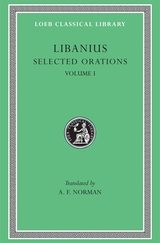 Selected Orations, Volume I
Libanius
Harvard University Press Pagans’ advocate.
Libanius (AD 314–393) was one of the last great publicists and teachers of Greek paganism. His story, as presented in his Autobiography and the Life by Eunapius, is supplemented by information from a correspondence of over 1500 items and sixty-four extant orations. A native of Antioch, he began his teaching career in Constantinople in 340, but soon had to retire to Nicomedeia, where he became acquainted with St. Basil and influential in the development of Julian’s paganism. After a second tenure at Constantinople he returned home to become professor in Antioch in 354, a position which he held, through many vicissitudes, for the rest of his life.
As sophist of Antioch and a devoted exponent of the traditional Hellenic system of education, Libanius remained deliberately and contemptuously unacquainted with Latin, and deplored its growing influence. Naturally humane in outlook and sympathizing with the local bourgeoisie, he criticized bitterly the encroachments and oppressions of the central administration, and the general cruelty of his day. Sincerely pagan in an increasingly aggressive Christian society, he became an influential voice against religious persecution, official or unofficial. The orations on Julian, to whose memory he remained devoted all his life, were composed between 362 and 365, and present Libanius with a congenial subject, revealing him at the height of his powers and influence.
Also available in the Loeb Classical Library is a two-volume edition of Libanius’ Autobiography and Selected Letters.
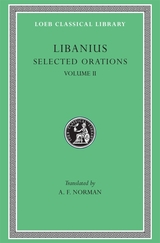 Selected Orations, Volume II
Libanius
Harvard University Press Pagans’ advocate.
Libanius (AD 314–393) was one of the last great publicists and teachers of Greek paganism. His story, as presented in his Autobiography and the Life by Eunapius, is supplemented by information from a correspondence of over 1500 items and sixty-four extant orations. A native of Antioch, he began his teaching career in Constantinople in 340, but soon had to retire to Nicomedeia, where he became acquainted with St. Basil and influential in the development of Julian’s paganism. After a second tenure at Constantinople he returned home to become professor in Antioch in 354, a position which he held, through many vicissitudes, for the rest of his life.
As sophist of Antioch and a devoted exponent of the traditional Hellenic system of education, Libanius remained deliberately and contemptuously unacquainted with Latin, and deplored its growing influence. Naturally humane in outlook and sympathizing with the local bourgeoisie, he criticized bitterly the encroachments and oppressions of the central administration, and the general cruelty of his day. Sincerely pagan in an increasingly aggressive Christian society, he became an influential voice against religious persecution, official or unofficial. The orations on Julian, to whose memory he remained devoted all his life, were composed between 362 and 365, and present Libanius with a congenial subject, revealing him at the height of his powers and influence.
Also available in the Loeb Classical Library is a two-volume edition of Libanius’ Autobiography and Selected Letters.
The Selected Papers of Edward Shils, Volume 3: The Calling of Sociology and Other Essays on the Pursuit of Learning
Edward Shils
University of Chicago Press, 1980 This third volume of the Selected Papers of Edward Shils brings together ten essays, three of which have never been published before and all the others of which have been completely revised and elaborated. They deal with the history of American and European sociology as an intellectual undertaking and as a means to the attainment of practical ends. Professor Shils's main themes are the influence of ethical and practical intentions on scholarly study in the social sciences, the autonomy of the intellectual tradition of sociology, and the significance of the institutional organization of sociological teaching and research.
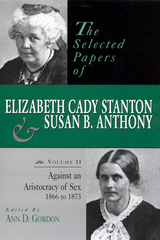 The Selected Papers of Elizabeth Cady Stanton and Susan B. Anthony: Against an Aristocracy of Sex, 1866 to 1873
Gordon, Ann D
Rutgers University Press, 2000 Against an Aristocracy of Sex, 1866-1873 is the second of six volumes of the Selected Papers of Elizabeth Cady Stanton and Susan B. Anthony. The entire collection documents the friendship and accomplishments of two of America's most important social and political reformers. Though neither Stanton nor Anthony lived to see passage of the Nineteenth Amendment in 1920, each of them devoted fifty-five years to the cause of women's suffrage.
The second volume picks up the story of Stanton and Anthony at the end of 1866, when they launched their drive to make universal suffrage the priority of Reconstruction. Through letters, speeches, articles, and diaries, this volume recounts their years as editor and publisher of the weekly paper the Revolution, their extensive travels, and their lobbying with Congress. It touches on the bitter division that occurred among suffragists over such controversial topics as marriage and divorce, and a national debate over the citizenship of women under the Fourteenth and Fifteenth Amendments. By the summer of 1873, when this volume ends, Anthony stood convicted of the federal crime of illegal citizenship of women under the Fourteenth and Fifteenth Amendments. By the summer of 1873, when this volume ends, Anthony stood convicted of the federal crime of illegal voting. An irate Stanton warned, "I felt afresh the mockery of this boasted chivalry of man towards woman."
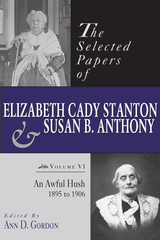 The Selected Papers of Elizabeth Cady Stanton and Susan B. Anthony: An Awful Hush, 1895 to 1906
Gordon, Ann D
Rutgers University Press, 2012 The “hush” of the title comes suddenly, when first Elizabeth Cady Stanton dies on October 26, 1902, and three years later Susan B. Anthony dies on March 13, 1906. It is sudden because Stanton, despite near blindness and immobility, wrote so intently right to the end that editors had supplies of her articles on hand to publish several months after her death. It is sudden because Anthony, at the age of eighty-five, set off for one more transcontinental trip, telling a friend on the Pacific Coast, “it will be just as well if I come to the end on the cars, or anywhere, as to be at home.”
Volume VI of this extraordinary series of selected papers is inescapably about endings, death, and silence. But death happens here to women still in the fight. An Awful Hush is about reformers trained “in the school of anti-slavery” trying to practice their craft in the age of Jim Crow and a new American Empire. It recounts new challenges to “an aristocracy of sex,” whether among the bishops of the Episcopal church, the voters of California, or the trustees of the University of Rochester. And it sends last messages about woman suffrage. As Stanton wrote to Theodore Roosevelt on the day before she died, “Surely there is no greater monopoly than that of all men, in denying to all women a voice in the laws they are compelled to obey.”
With the publication of Volume VI, this series is now complete.
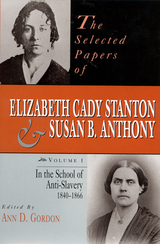 The Selected Papers of Elizabeth Cady Stanton and Susan B. Anthony: In the School of Anti-Slavery, 1840 to 1866
Gordon, Ann D
Rutgers University Press, 1997 In the School of Anti-Slavery, 1840-1866 is the first of six volumes of The Selected Papers of Elizabeth Cady Stanton and Susan B. Anthony. The collection documents the lives and accomplishments of two of America's most important social and political reformers. Though neither Stanton nor Anthony lived to see the passage of the Nineteenth Amendment in 1920, each of them devoted fifty-five years to the cause. Their names were synonymous with woman suffrage in the United States and around the world as they mobilized thousands of women to fight for the right to a political voice. Opening when Stanton was twenty-five and Anthony was twenty, and ending when Congress sent the Fourteenth Amendment to the states for ratification, this volume recounts a quarter of a century of staunch commitment to political change. Readers will enjoy an extraordinary collection of letters, speeches, articles, and diaries that tells a story-both personal and public-about abolition, temperance, and woman suffrage. When all six volumes are complete, the Selected Papers of Stanton and Anthony will contain over 2,000 texts transcribed from their originals, the authenticity of each confirmed or explained, with notes to allow for intelligent reading. The papers will provide an invaluable resource for examining the formative years of women's political participation in the United States. No library or scholar of women's history should be without this original and important collection.
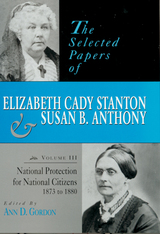 The Selected Papers of Elizabeth Cady Stanton and Susan B. Anthony: National Protection for National Citizens, 1873 to 1880
Gordon, Ann D
Rutgers University Press, 2003 National Protection for National Citizens, 1873 to 1880 is the third of six planned volumes of TheSelected Papers of Elizabeth Cady Stanton and Susan B. Anthony. The entire collection documents the friendship and accomplishments of two of America's most important social and political reformers. Though neither Stanton nor Anthony lived to see passage of the Nineteenth Amendment in 1920, each of them devoted fifty-five years to the cause of woman suffrage. The third volume of the Selected Papers of Elizabeth Cady Stanton and Susan B. Anthony opens while woman suffragists await the decision of the U.S. Supreme Court in cases testing whether the Constitution recognized women as voters within the terms of the Fourteenth and Fifteenth Amendments. At its close they are pursuing their own amendment to the Constitution and pressing the presidential candidates of 1880 to speak in its favor. Through their letters, speeches, articles, and diaries, the volume recounts the national careers of Elizabeth Cady Stanton and Susan B. Anthony as popular lecturers, their work with members of Congress to expand women's rights, their protests during the Centennial Year of 1876, and the launch that same year of their campaign for a Sixteenth Amendment.
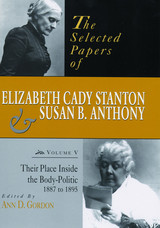 The Selected Papers of Elizabeth Cady Stanton and Susan B. Anthony: Their Place Inside the Body-Politic, 1887 to 1895
Gordon, Ann D
Rutgers University Press, 2009 Their Place Inside the Body-Politic is a phrase Susan B. Anthony used to express her aspiration for something women had not achieved, but it also describes the woman suffrage movement’s transformation into a political body between 1887 and 1895. This fifth volume opens in February 1887, just after the U.S. Senate had rejected woman suffrage, and closes in November 1895 with Stanton’s grand birthday party at the Metropolitan Opera House.
At the beginning, Stanton and Anthony focus their attention on organizing the International Council of Women in 1888. Late in 1887, Lucy Stone’s American Woman Suffrage Association announced its desire to merge with the national association led by Stanton and Anthony. Two years of fractious negotiations preceded the 1890 merger, and years of sharp disagreements followed. Stanton made her last trip to Washington in 1892 to deliver her famous speech “Solitude of Self.” Two states enfranchised women—Wyoming in 1890 and Colorado in 1893—but failures were numerous. Anthony returned to grueling fieldwork in South Dakota in 1890 and Kansas and New York in 1894. From the campaigns of 1894, Stanton emerged as an advocate of educated suffrage and staunchly defended her new position.
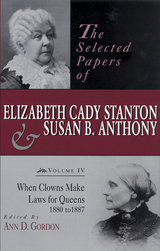 The Selected Papers of Elizabeth Cady Stanton and Susan B. Anthony: When Clowns Make Laws for Queens, 1880-1887
Gordon, Ann D
Rutgers University Press, 2006 When Clowns Make Laws for Queens, 1880 to 1887 is the fourth of six planned volumes of The Selected Papers of Elizabeth Cady Stanton and Susan B. Anthony. The entire collection documents the friendship and accomplishments of two of America's most important social and political reformers. At the opening of the fourth volume, suffragists hoped to speed passage of a sixteenth amendment to the Constitution through the creation of Select Committees on Woman Suffrage in Congress. Congress did not vote on the amendment until January 1887. Then, in a matter of a week, suffragists were dealt two major blows: the Senate defeated the amendment and the Senate and House reached agreement on the Edmunds-Tucker Act, disenfranchising all women in the Territory of Utah. As evidenced in this volume's selection of letters, articles, speeches, and diary entries, these were years of frustration. Suffragists not only lost federal and state campaigns for partial and full voting rights, but also endured an invigorated opposition. In spite of these challenges, Stanton and Anthony continued to pursue their life's work. In 1880 both women retired from lecturing to devote attention to their monumental History of Woman Suffrage. They also opened a new transatlantic dialogue about woman's rights during a trip to Europe in 1883.
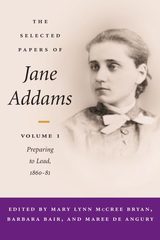 The Selected Papers of Jane Addams: vol. 1: Preparing to Lead, 1860-81
Edited by Mary Lynn McCree Bryan, Barbara Bair, and Maree de Angury
University of Illinois Press, 2002 Venturing into Usefulness, the second volume of The Selected Papers of Jane Addams, documents the experience of this major American historical figure, intellectual, social activist, and author between June 1881, when at twenty-one she had just graduated from Rockford Female Seminary, and early 1889, when she was on the verge of founding the Hull-House settlement with Ellen Gates Starr. During these years she evolved from a high-minded but inexperienced graduate of a women's seminary into an educated woman and seasoned traveler well-exposed to elite culture and circles of philanthropy. Themes inaugurated in the previous volume are expanded here, including dilemmas of family relations and gender roles; the history of education; the dynamics of female friendship; religious belief and ethical development; changes in opportunities for women; and the evolution of philanthropy, social welfare, and reform ideas.
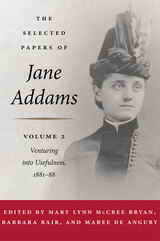 The Selected Papers of Jane Addams: Vol. 2: Venturing into Usefulness
Edited by Mary Lynn McCree Bryan, Barbara Bair, and Maree de Angury; with the assistance of Elizabeth Stevens, Stewart Burns, and Ellen Skerrett
University of Illinois Press, 2009 Venturing into Usefulness, the second volume of The Selected Papers of Jane Addams, documents the experience of this major American historical figure, intellectual, social activist, and author between June 1881, when at twenty-one she had just graduated from Rockford Female Seminary, and early 1889, when she was on the verge of founding the Hull-House settlement with Ellen Gates Starr. During these years she was developing into the social reformer and advocate of women's rights, socioeconomic justice, and world peace she would eventually become. She evolved from a high-minded but inexperienced graduate of a women's seminary into an educated woman and seasoned traveler well-exposed to elite culture and circles of philanthropy. Artfully annotated, The Selected Papers of Jane Addams offers an evocative choice of correspondence, photographs, and other primary documents, presenting a multi-layered narrative of Addams's personal and emerging professional life. Themes inaugurated in the previous volume are expanded here, including dilemmas of family relations and gender roles; the history of education; the dynamics of female friendship; religious belief and ethical development; changes in opportunities for women; and the evolution of philanthropy, social welfare, and reform ideas.
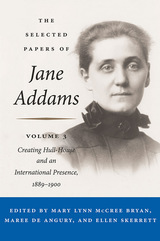 The Selected Papers of Jane Addams: Vol. 3: Creating Hull-House and an International Presence, 1889-1900
Jane Addams Edited by Mary Lynn McCree Bryan, Maree de Angury, and Ellen Skerrett: with the assistance of Richard R. Seidel,
University of Illinois Press, 2019 In 1889 an unknown but determined Jane Addams arrived in the immigrant-burdened, politically corrupt, and environmentally challenged Chicago with a vision for achieving a more secure, satisfying, and hopeful life for all. Eleven years later, her “scheme,” as she called it, had become Hull-House and stood as the template for the creation of the American settlement house movement while Addams’s writings and speeches attracted a growing audience to her ideas and work. The third volume in this acclaimed series documents Addams’s creation of Hull-House and her rise to worldwide fame as the acknowledged female leader of progressive reform. It also provides evidence of her growing commitment to pacifism. Here we see Addams, a force of thought, action, and commitment, forming lasting relationships with her Hull-House neighbors and the Chicago community of civic, political, and social leaders, even as she matured as an organizer, leader, and fund-raiser, and as a sought-after speaker, and writer. The papers reveal her positions on reform challenges while illuminating her strategies, successes, and responses to failures. At the same time, the collection brings to light Addams’s private life. Letters and other documents trace how many of her Hull-House and reform alliances evolved into deep, lasting friendships and also explore the challenges she faced as her role in her own family life became more complex. Fully annotated and packed with illustrations, The Selected Papers of Jane Addams, Volume 3 is a portrait of a woman as she changed—and as she changed history.
The Selected Papers of Margaret Sanger, Volume 1: The Woman Rebel, 1900-1928
Margaret Sanger, Edited by Esther Katz
University of Illinois Press, 2002 The birth control crusader, feminist, and reformer Margaret Sanger was one of the most controversial and compelling figures in the twentieth century. The Selected Papers of Margaret Sanger, Volume 1 is composed of Sanger’s letters, diaries, journals, articles, and speeches, most of which have not appeared previously in print. Now in paperback, the book documents the critical phases and influences of an American feminist icon and offers rare glimpses into her working-class childhood, burgeoning feminism, spiritual and scientific interests, sexual explorations, and diverse roles as wife, mother, lover, nurse, journalist, radical socialist, and activist.
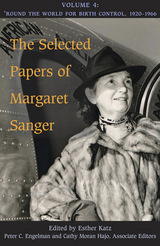 The Selected Papers of Margaret Sanger, Volume 4: Round the World for Birth Control, 1920-1966
Margaret Sanger: Edited by Esther Katz: Peter C. Engelman and Cathy Moran Hajo, Associate Editors
University of Illinois Press, 2016 When Margaret Sanger returned to Europe in 1920, World War I had altered the social landscape as dramatically as it had the map of Europe. Population concerns, sexuality, venereal disease, and contraceptive use had entered public discussion, and Sanger's birth control message found receptive audiences around the world. This volume focuses on Sanger from her groundbreaking overseas advocacy during the interwar years through her postwar role in creating the International Planned Parenthood Federation. The documents reconstruct Sanger's dramatic birth control advocacy tours through early 1920s Germany, Japan, and China in the midst of significant government and religious opposition to her ideas. They also trace her tireless efforts to build a global movement through international conferences and tours. Letters, journal entries, writings, and other records reveal Sanger's contentious dealings with other activists, her correspondence with the likes of Albert Einstein and Eleanor Roosevelt, and Sanger's own dramatic evolution from gritty grassroots activist to postwar power broker and diplomat. A powerful documentary history of a transformative twentieth-century figure, The Selected Papers of Margaret Sanger, Volume 4 is a primer for the debates on individual choice, sex education, and planned parenthood that remain all-too-pertinent in our own time.
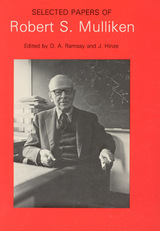 Selected Papers of Robert S. Mulliken
Robert S. Mulliken
University of Chicago Press, 1975 This book brings together in one volume the most important papers of Robert S. Mulliken, who was awarded the 1966 Nobel Prize in chemistry for his seminal work on chemical bonds and the electronic structures of molecules. The papers collected here range from suggestive to closely detailed analyses of various topics in the theory of spectra and electronic structure of diatomic and polyatomic molecules. Professor Mulliken has written introductory commentaries on each of the volume's seven parts.
Included in the volume are essays of general as well as scientific interest; they are grouped under thematic headings. Part I contains those papers which are of historical significance. An autobiographical piece by Dr. Mulliken offers a glimpse of the many famous people whom he has known. Also reprinted is the text of his Nobel Prize acceptance speech. At the end is a list of his students and other co-workers, and a complete bibliography of his papers.
Part II includes Mulliken's work on band spectra and chemistry as well as his research on the assignment of quantum numbers for electrons in molecules. Part III surveys the author's early work on the bonding power of electrons and the method of molecular orbitals. Included is a discussion of the structure and spectra of a number of important types of molecules. The papers in part IV focus on the intensities of electronic transitions in molecular spectra. This incorporates Mulliken's work on charge transfer and the halogen molecule spectra.
The problems addressed in part V center on the spectra and structure of polyatomic molecules. Reprinted here is a report which Mulliken prepared on notation for polyatomic molecules. Part VI is devoted to the problem of hyperconjugation. These papers develop and apply the concept of hyperconjugation and explore its relation to the concept of conjugation. The last part offers some of the most important papers from the author's postwar publications. The central focus is on molecular orbital theory, the area in which Mulliken's Nobel-winning discoveries were made.
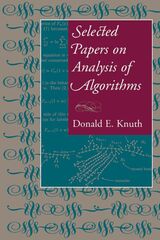 Selected Papers on Analysis of Algorithms
Donald E. Knuth
CSLI, 2000 Analysis of Algorithms is the fourth in a series of collected works by world-renowned computer scientist Donald Knuth. This volume is devoted to an important subfield of Computer Science that Knuth founded in the 1960s and still considers his main life's work. This field, to which he gave the name Analysis of Algorithms, deals with quantitative studies of computer techniques, leading to methods for understanding and predicting the efficiency of computer programs. Analysis of Algorithms, which has grown to be a thriving international discipline, is the unifying theme underlying Knuth's well known book The Art of Computer Programming. More than 30 of the fundamental papers that helped to shape this field are reprinted and updated in the present collection, together with historical material that has not previously been published. Although many ideas come and go in the rapidly changing world of computer science, the basic concepts and techniques of algorithmic analysis will remain important as long as computers are used.
Selected Papers on Fun and Games
Donald E. Knuth
CSLI, 2011 Donald E. Knuth’s influence in computer science ranges from the invention of methods for translating and defining programming languages to the creation of the TeX and METAFONT systems for desktop publishing. His award-winning textbooks have become classics that are often given credit for shaping the field, and his scientific papers are widely referenced and stand as milestones of development over a wide variety of topics. The present volume is the eighth in a series of his collected papers.
Selected Papers on the Pathogenic Rickettsiae
Nicholas Hahon
Harvard University Press Rickettsiae comprise a group of paleomorphic, coccobacillary microorganisms that are now regarded as true bacteria. Nicholas Rahon presents a collection of papers that deal exclusively with pathogenic rickettsiae. The selected papers—twenty-nine in all and fully illustrated—range from the sixteenth century to the modern era. A number of the papers are classics in the field and several of the selections appear in English translation for the first time. The editor provides a preface to each selection and his general introduction defines the subject matter, surveys historical developments in the field, and summarizes recent research.
 Selected Papers, Volume 1: Stellar Structure and Stellar Atmospheres
S. Chandrasekhar
University of Chicago Press, 1989 This is the first of six volumes collecting significant papers of the distinguished astrophysicist and Nobel laureate S. Chandrasekhar. His work is notable for its breadth as well as for its brilliance; his practice has been to change his focus from time to time to pursue new areas of research. The result has been a prolific career full of discoveries and insights, some of which are only now being fully appreciated.
Chandrasekhar has selected papers that trace the development of his ideas and that present aspects of his work not fully covered in the books he has periodically published to summarize his research in each area.
Volume 1, Stellar Structure and Stellar Atmospheres, covers primarily the period 1930-40 and includes early papers on the theory of white dwarfs. In the Preface, Chandrasekhar explains the criteria for selection and provides historical background. Each subsequent volume will include a foreword by an authority on the topics covered.
 Selected Papers, Volume 2: Radiative Transfer and Negative Ion of Hydrogen
S. Chandrasekhar
University of Chicago Press, 1989 This is the second of six volumes collecting significant papers of the distinguished astrophysicist and Nobel laureate S. Chandrasekhar. His work is notable for its breadth as well as for its brilliance; his practice has been to change his focus from time to time to pursue new areas of research. The result has been a prolific career full of discoveries and insights, some of which are only now being fully appreciated.
Chandrasekhar has selected papers that trace the development of his ideas and that present aspects of his work not fully covered in the books he has periodically published to summarize his research in each area.
Volume 2 covers primarily the period 1940-50 and includes papers on the theory of radiative transfer and on the physics and astrophysics of the negative ion of hydrogen. Of particular note are Chandrasekhar's Gibbs Lecture to the American Mathematical Society in 1946 and his "Personal Account" presented at a conference at Erevan in the U.S.S.R. in 1981. A foreword by T. W. Mullikin, a distinguished scholar in the area of radiative transfer, and an author's note provide a historical context for the papers.
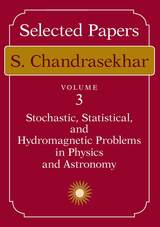 Selected Papers, Volume 3: Stochastic, Statistical, and Hydromagnetic Problems in Physics and Astronomy
S. Chandrasekhar
University of Chicago Press, 1989 This is the third of six volumes collecting significant papers of the distinguished astrophysicist and Nobel laureate S. Chandrasekhar. His work is notable for its breadth as well as for its brilliance; his practice has been to change his focus from time to time to pursue new areas of research. The result has been a prolific career full of discoveries and insights, some of which are only now being fully appreciated.
Chandrasekhar has selected papers that trace the development of his ideas and that present aspects of his work not fully covered in the books he has periodically published to summarize his research in each area.
This volume is divided into four sections. The first, on dynamical friction and Brownian motion, includes papers written after Chandrasekhar published his 1942 monograph Principles of Stellar Dynamics. Also in this section is "Stochastic Problems in Physics and Astronomy," one of the most cited papers in the physics literature, as well as papers written jointly with John von Neumann that have been given impetus to recent research. As Chandrasekhar notes, the papers in the second section, on statistical problems in astronomy, were influenced by Ambartsumian's analysis of brightness in the Milky Way. A third section on the statistical theory of turbulence addresses issues still unresolved in fluid dynamics, and the last section is devoted to hydromagnetic problems in astrophysics that are not discussed in Chandrasekhar's monographs.
 Selected Papers, Volume 4: Plasma Physics, Hydrodynamic and Hydromagnetic Stability, and Applications of the Tensor-Virial Theorem
S. Chandrasekhar
University of Chicago Press, 1989 This is the fourth of six volumes collecting significant papers of the distinguished astrophysicist and Nobel laureate S. Chandrasekhar. His work is notable for its breadth as well as for its brilliance; his practice has been to change his focus from time to time to pursue new areas of research. The result has been a prolific career full of discoveries and insights, some of which are only now being fully appreciated.
Chandrasekhar has selected papers that trace the development of his ideas and that present aspects of his work not fully covered in the books he has periodically published to summarize his research in each area.
Volume 4 has three parts. The first, on plasma physics, includes joint work with A. N. Kaufman and K. M. Watson on the stability of the pinch, as well as a paper on Chandrasekhar's own approach to the topic of adiabatic invariants. Part 2 includes work with specific scientific applications of hydrodynamic and hydromagnetic stability not covered in his monograph on the subject. The final part contains Chandrasekhar's papers on the scientific applications of the tensor-virial theorem, in which he restores to its proper place Riemann's neglected work with ellipsoidal figures.
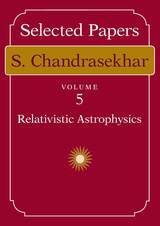 Selected Papers, Volume 5: Relativistic Astrophysics
S. Chandrasekhar
University of Chicago Press, 1990 This is the fifth of six volumes collecting significant papers of the distinguished astrophysicist and Nobel laureate S. Chandrasekhar. His work is notable for its breadth as well as for its brilliance; his practice has been to change his focus from time to time to pursue new areas of research. The result has been a prolific career full of discoveries and insights, some of which are only now being fully appreciated.
Chandrasekhar has selected papers that trace the development of his ideas and that present aspects of his work not fully covered in the books he has periodically published to summarize his research in each area.
Volume 5 covers all of Chandrasekhar's contributions to the general theory of relativity and relativity's astrophysical applications (except his research on black holes and colliding gravitational waves, which is covered in Volume 6). The major topics include the influence of general relativity on the pulsations and stability of stars; the back reaction of gravitational waves on their sources; and post-Newtonian approximations to general relativity and their astrophysical applications. In addition to research papers, the volume includes two 1972 lectures in which Chandrasekhar assessed the past, present, and future of relativistic astrophysics. The foreword by astrophysicist Kip S. Thorne is an absorbing, brief history of the field since 1961, capturing the atmosphere of the early research and clarifying Chandrasekhar's dominant role in it.
Chandrasekhar has never written a monograph synthesizing his research in relativistic astrophysics, and therefore this volume of his papers serves as a summary of that work for students and more senior researchers.
Selected Papers, Volume 6: The Mathematical Theory of Black Holes and of Colliding Plane Waves
S. Chandrasekhar
University of Chicago Press, 1991 This is the first of six volumes collecting significant papers of the distinguished astrophysicist and Nobel laureate S. Chandrasekhar. His work is notable for its breadth as well as for its brilliance; his practice has been to change his focus from time to time to pursue new areas of research. The result has been a prolific career full of discoveries and insights, some of which are only now being fully appreciated.
Chandrasekhar has selected papers that trace the development of his ideas and that present aspects of his work not fully covered in the books he has periodically published to summarize his research in each area.
 Selected Papers, Volume 7: The Non-Radial Oscillations of Stars in General Relativity and Other Writings
S. Chandrasekhar
University of Chicago Press, 1997 In these selections readers are treated to a rare opportunity to see the
world through the eyes of one of the twentieth century's most brilliant
and sensitive scientists. Conceived by Chandrasekhar as a supplement to
his Selected Papers, this volume begins with eight papers he
wrote with Valeria Ferrari on the non-radial oscillations of stars. It
then explores some of the themes addressed in Truth and Beauty,
with meditations on the aesthetics of science and the world it examines.
Highlights include: "The Series Paintings of Claude Monet and the
Landscape of General Relativity," "The Perception of Beauty and the
Pursuit of Science," "On Reading Newton's Principia at Age Past
Eighty," and personal recollections of Indira Gandhi, Jawaharlal Nehru,
and others.
Selected Papers, Volume 7 paints a picture of Chandra's universe,
filled with stars and galaxies, but with space for poetics, paintings,
and politics.
The late S. Chandrasekhar was best known for his discovery of the upper
limit to the mass of a white dwarf star, for which he received the Nobel
Prize in Physics in 1983. He was the author of many books, including
The Mathematical Theory of Black Holes and, most recently,
Newton's Principia for the Common Reader.
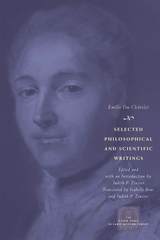 Selected Philosophical and Scientific Writings
Emilie Du Châtelet
University of Chicago Press, 2009 Though most historians remember her as the mistress of Voltaire, Emilie Du Châtelet (1706–49) was an accomplished writer in her own right, who published multiple editions of her scientific writings during her lifetime, as well as a translation of Newton’s Principia Mathematica that is still the standard edition of that work in French. Had she been a man, her reputation as a member of the eighteenth-century French intellectual elite would have been assured. In the 1970s, feminist historians of science began the slow work of recovering Du Châtelet’s writings and her contributions to history and philosophy. For this edition, Judith P. Zinsser has selected key sections from Du Châtelet’s published and unpublished works, as well as related correspondence, part of her little-known critique of the Old and New Testaments, and a treatise on happiness that is a refreshingly uncensored piece of autobiography—making all of them available for the first time in English. The resulting volume will recover Châtelet’s place in the pantheon of French letters and culture.
Selected Philosophical Essays
Max Scheler
Northwestern University Press, 1973 Included are essays in epistemology, metaphysics, and philosophical psychology by one of the most important twentieth-century continental philosophers.
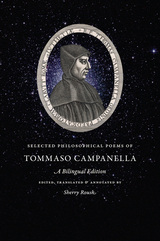 Selected Philosophical Poems of Tommaso Campanella: A Bilingual Edition
Tommaso Campanella
University of Chicago Press, 2011 A contemporary of Giordano Bruno and Galileo, Tommaso Campanella (1568–1639) was a controversial philosopher, theologian, astrologer, and poet who was persecuted during the Inquisition and spent much of his adult life imprisoned because of his heterodox views. He is best known today for two works: The City of the Sun, a dialogue inspired by Plato’s Republic, in which he prophesies a vision of a unified, peaceful world governed by a theocratic monarchy; and his well-meaning Defense of Galileo, which may have done Galileo more harm than good because of Campanella’s previous conviction for heresy. But Campanella’s philosophical poems are where his most forceful and undiluted ideas reside. His poetry is where his faith in observable and experimental sciences, his astrological and occult wisdom, his ideas about deism, his anti-Aristotelianism, and his calls for religious and secular reform most put him at odds with both civil and church authorities. For this volume, Sherry Roush has selected Campanella’s best and most idiosyncratic poems, which are masterpieces of sixteenth-century Italian lyrics, displaying a questing mind of great, if unorthodox, brilliance, and showing Campanella’s passionate belief in the intrinsic harmony between the sacred and secular.
Selected Philosophical, Scientific, and Autobiographical Writings
Marie-Geneviève-Charlotte Thiroux d’Arconville
Iter Press, 2018 Marie-Geneviève-Charlotte Thiroux d’Arconville combined fierce intellectual ambition with the proper demeanor of the wife of a leading magistrate. Bemoaning her lack of a formal education in childhood, as an adult she read widely, studied languages, and sought out mentors among the scientific elite of the day. Always publishing anonymously, her works included moralist philosophy, scientific and literary translations, original scientific research, fiction, and history. Recently, a trove of unpublished essays and autobiographical writings from her final years, long thought to have been lost, has come to light, revealing her as a writer of insight, wit, and feeling.
Edited and translated by Julie Candler Hayes
The Other Voice in Early Modern Europe: The Toronto Series, volume 58
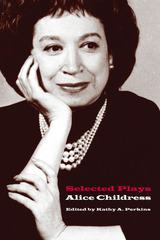 Selected Plays
Alice Childress
Northwestern University Press, 2011 The first African American woman to have a play professionally produced in New York City (Gold Through the Trees, in 1952), Alice Childress occupies an important but surprisingly under-recognized place in American drama. She herself rejected an emphasis on the pioneering aspects of her career, saying that “it’s almost like it’s an honor rather than a disgrace” and that she should “be the fiftieth and the thousandth by this point”—a remark that suggests the complexity and singularity of vision to be found in her plays. Childress worked as an actress before turning to playwriting in 1949, and she was a political activist all of her life.
Spanning the 1940s to the 1960s, the plays collected here are the ones Childress herself believed were her best, and offer a realistic portrait of the racial inequalities and social injustices that characterized these decades. Her plays often feature strong-willed female protagonists whose problems bring into harsh relief the restrictions faced by African American women. This is the first volume devoted exclusively to the work of a major playwright whose impact on the American theater was profound and lasting.
Selected Plays of Stan Lai: Volume 2: The Village and Other Plays
Stan Lai, edited by Lissa Tyler Renaud
University of Michigan Press, 2021 These volumes feature works from across Lai’s career, providing an exceptional selection of a diverse range of performances.
Volume Two contains:
Millennium Teahouse
Sand on a Distant Star
Like Shadows
The Village
Writing in Water
Selected Plays, Volume I
August Strindberg
University of Minnesota Press, 2012 August Strindberg is often considered the father of modern Swedish literature. His vast output of plays was innovative in style and form. Volume 1 of Selected Plays presents selections from the beginning of his career, before Strindberg’s period of psychotic attacks in the 1890s. Master Olof (1872) is a historical drama set in early Reformation Sweden, influenced by Ibsen and Shakespeare. Two of his most produced plays today, The Father (1887) and Miss Julie (1888), are examples of his naturalistic plays. Strindberg described Creditors (1888), a tragicomedy, as his “most mature work.” The Stronger (1889), a playlet, is a favorite in acting classes. Playing with Fire (1893) is one of his few comedies. These plays deal with Strindberg’s preoccupation with power struggles and sexual warfare.
Selected Plays, Volume II
August Strindberg
University of Minnesota Press, 2012 This second volume of the great Swedish writer August Strindberg’s plays begins with To Damascus I (1898), the first of a trilogy. It mirrors his own departure from the naturalism he had explored in several of his earlier works, as he set forth on a spiritual odyssey. Crimes and Crimes (1899), from the beginning of his symbolist mode, is a lighter take on the themes in To Damascus I. The first of a two-part play, Dance of Death I (1900) depicts a dysfunctional marriage. A Dream Play (1901), which is one of Strindberg’s most influential, shows reality converted into a dream; many critics consider it his greatest play. In 1907, Strindberg founded the Intimate Theater in Stockholm; The Ghost Sonata (1907) and The Pelican (1907), which were written for its opening, are two examples of a chamber play, a genre that Strindberg helped to originate.
Selected Poems
Lee Gerlach
Ohio University Press, 2005 Lee Gerlach’s Selected Poems is a rigorous culling from the life’s work of a remarkable and prolific poet. Written over a period of fifty years, the poetry of Lee Gerlach is a full spectrum of human expression, vision, and experience. It reflects a wisdom and maturity of character that has been constant during the entire span of Gerlach’s writing career. This selection, chosen by the poet, is the retrospective of a true twentieth-century American original.
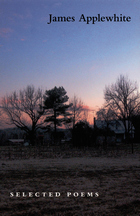 Selected Poems
James Applewhite
Duke University Press, 2005 James Applewhite has produced nine extraordinary books of poetry. This volume is the first anthology of his remarkable oeuvre. It brings together chronologically arranged selections from all of his previous books, from the first, published in 1975, through the most recent, published in 2002. Applewhite’s poetry is deeply rooted in the history and rhythms of rural North Carolina, where he was born and raised, and these poems mark stages in an artistic and personal journey he has undertaken over the past thirty years. In impeccable and surprising language, Applewhite depicts the social conventions, changes, frictions, and continuities of small southern towns. He celebrates that which he values as decent and life-enhancing, and his veneration is perhaps most apparent in his response to the natural world, to the rivers and trees and flowers. Yet Applewhite’s love for his native land is not straightforward. His verse chronicles his conflicted feelings for the region that gave him the initial, evocative language of place and immersed him in a blazing sensory world while it also bequeathed the distortions, denials, and prejudices that make it so painful a labyrinth. Rendering troubled legacies as well as profound decency, Applewhite reveals the universally human in a distinctively local voice, within dramatic and mundane moments of hope and sorrow and faith.
Selected Poems
Johann W. Goethe
Northwestern University Press, 1998 One of world literature's towering figures, Goethe dominated two centuries of European writing and thought. The Enlightenment's most wayward genius, and Romanticism's most remarkable, he led two great artistic movements without fully subscribing to either. While his stature in the English-speaking world is often acknowledged, his poems are little regarded, for the simple reason that they have proven untranslatable. But thanks to John Whaley's outstanding translation, Goethe's poetry can at last be appreciated in English, with all its grace, music, and humanity intact.
Selected Poems
John Frederick Nims
University of Chicago Press, 1982 Selected Poems represents the best of John Frederick Nims's widely aclaimed work over the past thirty years. Selections are from Five Young American Poets, Third Series (1944), The Iron Pastoral (1947), A Fountain in Kentucky (1950), Knowledge of the Evening (1960), and Of Flesh and Bone (1967) and emcompasses the full range of one of contemporary America's foremost poets.
Selected Poems
Lorna Goodison
University of Michigan Press, 1993 A selection of poems by Lorna Goodison, who in 2017 was named Poet Laureate of Jamaica.
 Selected Poems
Nikos Engonopoulos
Harvard University Press, 2012 Nikos Engonopoulos (1907–1985) was one of the most prominent representatives of Greek Surrealist poetry and painting. Closely associated with Andreas Embeirikos, the “patriarch” of Surrealism in Greece, and with Nicolas Calas, an influential figure of the European and American avant-garde, Engonopoulos developed highly experimental pictorial and poetic aesthetics. In both his paintings and poems, he engaged in a critical, often ironic dialogue with Greek history and cultural traditions and their ideological appropriations in established cultural and political discourses. Engonopoulos was arguably the keenest advocate of Surrealist black humor and irony in Greece. His overall approach to the Greek past, informed as it was by the socio-aesthetic principles of French Surrealism, constitutes one of the most ingenious and provocative cases of artistic mythogenesis in the European avant-garde.
This volume offers a collection of his most representative poems, including his long poem Bolivár, which was written in the winter of 1942–1943 and soon acquired the status of an emblematic act of resistance against the Nazis and their allies (Italians and Bulgarians), who had occupied Greece in 1941.
Selected Poems
Vladimir Mayakovsky, Translated from the Russian by James H. McGavran III
Northwestern University Press, 2013 James McGavran’s new translation of Vladimir Mayakovsky’s poetry is the first to fully capture the Futurist and Soviet agitprop artist’s voice. Because of his work as a propagandist for the Soviet regime, and because of his posthumous enshrinement by Stalin as “the best and most talented poet of our Soviet epoch,” Mayakovsky has most often been interpreted—and translated—within a political context. McGavran’s translations reveal a more nuanced poet who possessed a passion for word creation and linguistic manipulation. Mayakovsky’s bombastic metaphors and formal élan shine through in these translations, and McGavran’s commentary provides vital information on Mayakovsky, illuminating the poet’s many references to the Russian literary canon, his contemporaries in art and culture, and Soviet figures and policies.
Selected Poems
Jean Garrigue. Introduction by J. D. McClatchy
University of Illinois Press, 1992 Selected Poems is compiled from the best works in Jean Garrigue's eight published collections. Garrigue (1914-72) is recognized as a leading American poet of the fifties and sixties. Among her awards and honors were a Guggenheim fellowship and a National Institute of Arts and Letters grant.
Selected Poems
Luigi Di Ruscio
Seagull Books, 2023 The first English translation of an Italian poet known for his uncompromising integrity and strong leftist sympathy for the working man.
Born in a sub-proletarian ghetto in Italy in 1930 under the fascist regime, Luigi Di Ruscio was an urchin running wild in the countryside, a Communist with clear anarchist leanings, a jack-of-all-trades. In 1957 he emigrated to Oslo, where he worked for forty years in a steel-wire factory, spending his evenings at the typewriter, delving with furious energy into his native Italian. Di Ruscio insisted that whereas the language of power is always a contrived, one-way fabrication, the language of the underprivileged is upfront and direct, aiming straight and sharp for the truth. Caustic as a shopfloor scouring agent, exhilarating in its overabundance, humor, and outspokenness, Selected Poems stands as a testament of tenacity, a record of class struggle, and a vital presence for our times.
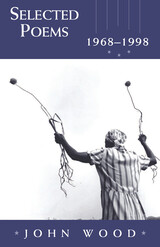 Selected Poems, 1968–1998
John Wood
University of Arkansas Press, 1999 Selected Poems, 1968–1998, represents thirty years of John Wood's work, offering his readers a most comprehensive view of an unusual mind and spirit that is at once eloquent and humorous. In poems that range from narratives, lyrics, and elegies, to odes, satires, and even a mini-epic, his work whips language into intense emotion. Recalled memories tumble with sense and grace. The homely and the visionary intertwine as the often stark realities of human experience are infused with love and light. The prospering genius of these poems is that they seek not so much to redeem or reclaim what is lost, but to redirect perspectives with a generous sweep of possibilities. Wood's craft as a wordsmith gives us a voice that powerfully interprets what it means to be human and alive. John Wood holds professorships in both photographic history and English literature at McNeese State University in Lake Charles, Louisiana, where he is also director of the Master of Fine Arts Program in Creative Writing. He is the author of three previous books of poetry and seven books of art and photographic criticism. His books have won the Iowa Poetry Prize twice, the American Library Association's Choice Outstanding Academic Books of 1992, and the New York Times Book Review Best Photo Books of 1995.
Selected Poems, 1969-1981
Richard Shelton
University of Pittsburgh Press, 1982 Shelton assembles the best of his previous work together with a selection of new poems.
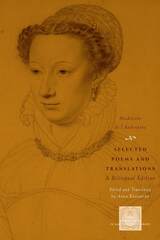 Selected Poems and Translations: A Bilingual Edition
Madeleine de l'Aubespine
University of Chicago Press, 2007 Madeleine de l’Aubespine (1546–1596), the toast of courtly and literary circles in sixteenth-century Paris, penned beautiful love poems to famous women of her day. The well-connected daughter and wife of prominent French secretaries of state, l’Aubespine was celebrated by her male peers for her erotic lyricism and scathingly original voice.
Rather than adopt the conventional self-effacement that defined female poets of the time, l’Aubespine’s speakers are sexual, dominant, and defiant; and her subjects are women who are able to manipulate, rebuke, and even humiliate men.
Unavailable in English until now and only recently identified from scattered and sometimes misattributed sources, l’Aubespine’s poems and literary works are presented here in Anna Klosowska’s vibrant translation. This collection, which features one of the first French lesbian sonnets as well as reproductions of l’Aubespine’s poetic translations of Ovid and Ariosto, will be heralded by students and scholars in literature, history, and women’s studies as an important addition to the Renaissance canon.
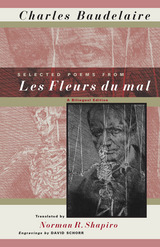 Selected Poems from Les Fleurs du mal: A Bilingual Edition
Charles Baudelaire
University of Chicago Press, 1998 In a masterly translation by Norman Shapiro, this selection of poems from Les Fleurs du mal demonstrates the magnificent range of Baudelaire's gift, from the exquisite quatrains to the formal challenges of his famous sonnets. The poems are presented in both French and English, complemented by the work of illustrator David Schorr. As much a pleasure to look at as it is to read, this volume invites newcomers and devotees alike to experience Baudelaire's genius anew.
"A fine, formal translation of the best poems of France's founder of the symbolist movement."—St. Louis Post-Dispatch
"It's rare to find a rewarding translation of a masterwork, particularly a collection of groundbreaking poetry. . . . Through Shapiro's skillful wordsmithing, the reader can fully appreciate Baudelaire's control of the soul and the word which is the ancient and indefatigable ambition of all great poets. . . . Shapiro's interpretations set the standard for future English translations."—Virginia Quarterly Review
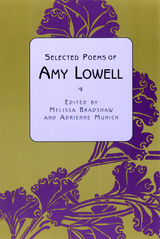 Selected Poems of Amy Lowell
Bradshaw, Melissa
Rutgers University Press, 2002 Amy Lowell (1874–1925), American poet and critic, was one of the most influential and best-known writers of her era. Within a thirteen-year period, she produced six volumes of poetry, two volumes of criticism, a two-volume biography of John Keats, and countless articles and reviews that appeared in many popular periodicals. As a herald of the New Poetry, Lowell saw herself and her kind of work as a part of a newly forged, diverse, American people that registered its consciousness in different tonalities but all in a native idiom. She helped build the road leading to the later works of Allen Ginsberg, May Sarton, Sylvia Plath, and beyond. Except for the few poems that invariably appear in American literature anthologies, most of her writings are out of print. This will be the first volume of her work to appear in decades, and the depth, range, and surprising sensuality of her poems will be a revelation.
The poetry is organized according to Lowell’s characteristic forms, from traditional to experimental. In each section the works appear in chronological order. Section one contains sonnets and other traditional verse forms. The next section covers her translations and adaptations of Chinese and Japanese poetry, whereby she beautifully renders the spirit of these works. Also included here are several of Lowell’s own Asian-influenced poems. Lowell’s free, or cadenced verse appears in the third part. The last section provides samples of Lowell’s polyphonic prose, an ambitious and vigorous art form that employs all of the resources of poetry.
The release of The Selected Poems of Amy Lowell will be a major event for readers who have not been able to find a representative sampling of work from this vigorous, courageous poet who gave voice to an erotic, thoroughly American sensibility.
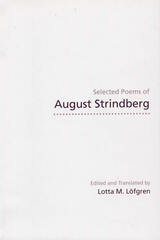 Selected Poems of August Strindberg
Lotta Lofgren
Southern Illinois University Press, 2002 August Strindberg (1849–1912) was one of the great innovators of modern drama as well as a novelist, poet, and master of the Swedish language. In this collection, Selected Poems of August Strindberg, editor and translator Lotta M. Löfgren has chosen poems from all three volumes of Strindberg’s verse—Poems in Verse and Prose, Sleepwalking Nights on Awake Days, and Word Play and Minor Art—to illustrate to the English-speaking reader the development, strengths, and versatility of Strindberg the poet. Löfgren explains, “Although August Strindberg is internationally acknowledged as a pioneering realist, expressionist, and surrealist playwright, his poetry is still relatively unknown outside Sweden. The only English translation of [his] poems to date is the 1978 translation of Sleepwalking Nights by Arvid Paulson . . . that gives an incomplete and misleading picture of Strindberg’s poetry.” Löfgren’s translation seeks to correct that picture. Strindberg’s stature as a dramatist alone may be adequate justification for offering a translation of his verse, but his poetry stands well on its own. All three volumes broke new ground and paved the way for younger generations of poets. Löfgren hopes that her translation will not only introduce Strindberg’s verse to English-speaking readers but will also inspire other scholars to revisit his poetry and give it the attention it deserves. Selected Poems of August Strindberg received the American-Scandinavian Foundation’s Translation Prize in 2000.
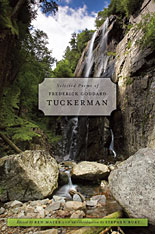 Selected Poems of Frederick Goddard Tuckerman
Frederick Goddard Tuckerman
Harvard University Press, 2010 Unlike Whitman, Dickinson, or Wordsworth, Frederick Goddard Tuckerman (1821–1873) never wanted to start a revolution in poetry. Nor did he—like Longfellow or his friend Tennyson—capture or ever try to represent the spirit of his age. Yet he remains one of America’s most passionate, moving, and technically accomplished poets of the nineteenth century: a New Englander through and through, a poet of the outdoors, wandering fields and wooded hillsides by himself, driven to poetry and the solitude of nature by the loss of his beloved wife. This is the persona we encounter again and again in Tuckerman’s sonnets and stanzaic lyric poetry.
Correcting numerous errors in previous editions, this is the first reliable reading edition of Tuckerman’s poetry. Ben Mazer has painstakingly re-edited the poems in this selection from manuscripts at the Houghton Library. Included in this generous selection are several important poems omitted in The Complete Poems of Frederick Goddard Tuckerman. In her introduction to the volume, Stephanie Burt celebrates an extraordinary poet of mourning and nature—an anti-Transcendental—who in many ways seems closer to writers of our own century than to, say, Emerson or even Thoreau. Readers who enjoy the verse of Richard Wilbur, Anthony Hecht, or Mary Oliver will find much to admire in Tuckerman’s poetry.
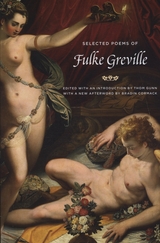 The Selected Poems of Fulke Greville
Fulke Greville
University of Chicago Press, 2009 Along with his childhood friend Sir Philip Sidney, Fulke Greville (1554–1628) was an important member of the court of Queen Elizabeth I. Although his poems, long out of print, are today less well known than those of Sidney, Spenser, or Shakespeare, Greville left an indelible mark on the world of Renaissance poetry, both in his love poems, which ably work within the English Petrarchan tradition, and in his religious meditations, which, along with the work of Donne and Herbert, stand as a highpoint of early Protestant poetics. Back in print for a new generation of scholars and readers, Thom Gunn’s selection of Greville’s short poems includes the whole of Greville’s lyric sequence, Caelica, along with choruses from some of Greville’s verse dramas. Gunn’s introduction places Greville’s thought in historical context and in relation to the existential anxieties that came to preoccupy writers in the twentieth century. It is as revealing about Gunn himself, and the reading of earlier English verse in the 1960s, as it is about Greville’s own poetic achievement. This reissue of Selected Poems of Fulke Greville is an event of the first order both for students of early British literature and for readers of Thom Gunn and English poetry generally.
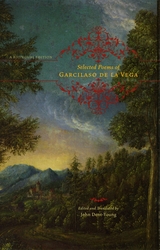 Selected Poems of Garcilaso de la Vega: A Bilingual Edition
Garcilaso de la Vega
University of Chicago Press, 2009 Garcilaso de la Vega (ca. 1501–36), a Castilian nobleman and soldier at the court of Charles V, lived a short but glamorous life. As the first poet to make the Italian Renaissance lyric style at home in Spanish, he is credited with beginning the golden age of Spanish poetry. Known for his sonnets and pastorals, gracefully depicting beauty and love while soberly accepting their passing, he is shown here also as a calm student of love’s psychology and a critic of the savagery of war. This bilingual volume is the first in nearly two hundred years to fully represent Garcilaso for an Anglophone readership. In facing-page translations that capture the music and skill of Garcilaso’s verse, John-Dent Young presents the sonnets, songs, elegies, and eclogues that came to influence generations of poets, including San Juan de la Cruz, Luis de Leon, Cervantes, and Góngora. The Selected Poems of Garcilaso de la Vega will help to explain to the English-speaking public this poet’s preeminence in the pantheon of Spanish letters.
 The Selected Poems Of Howard Nemerov
Howard Nemerov
Ohio University Press, 2003 Howard Nemerov—poet laureate of the United States, winner of the Pulitzer Prize and National Book Award, and chancellor of the Academy of American Poets—was one of the most prolific and significant American poets of the twentieth century. By the time of his death in 1991, he had published fourteen collections of poetry. Judiciously selected and introduced by poet Daniel Anderson, The Selected Poems of Howard Nemerov represents the broad spectrum of Nemerov’s virtues as a poet—his intelligence, his wit, his compassion, and his irreverence. It stands as the retrospective collection of the best of what Nemerov left behind, which is some of the finest poetry that the twentieth century produced. “To keep his errors down to a minimum,” W. H. Auden wrote, “the internal Censor to whom a poet submits his work in progress should be a Censorate. It should include, for instance, a sensitive only child, a practical housewife, a logician, a monk, an irreverent buffoon a nd even, perhaps, hated by all others and returning their dislike, a brutal, foul-mouthed drill sergeant who considers all poetry rubbish.” Such are the readers to whom the poetry of Howard Nemerov might appeal. He distinguished himself on the landscape of American letters as a writer of great versatility. More than a decade after his death, that claim still holds true. In this, the only edition of Nemerov’s work that surveys his entire poetic output, first-time readers of these poems will find an introduction to a truly remarkable creative mind. Longtime admirers of Nemerov will be reminded once again of his significance as a craftsman and philosopher, and as a poetic steward of the many ways in which we experience the world.
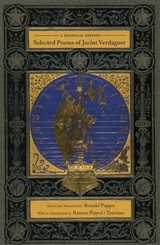 Selected Poems of Jacint Verdaguer: A Bilingual Edition
Jacint Verdaguer
University of Chicago Press, 2007 Regarded as one of Europe’s most important poets of the late nineteenth century, Jacint Verdaguer (1845–1902) provided the modern poetic foundations for the reemergence of Catalan literature after three centuries of the language’s suppression by Spain’s absolutist monarchs. Verdaguer’s popular epic, civil, and religious verse poeticized the unique status of Catalonian tradition, progress, and history in the Romantic framework of European nation-building.
Selected Poems is the first book-length translation of Verdaguer’s works into English. Ronald Puppo offers readable and faithful verse adaptations of poetry from all periods of the poet-priest’s life, from his days as a seminary student and farmhand to his journeys as a ship’s chaplain and eventual spiritual crisis. These adroit translations will recover Verdaguer as a major figure in the modern literary tradition of the West, restoring him to the pantheon of world letters.
Selected Poems Of Janet Lewis
Janet Lewis
Ohio University Press, 2000 Since the appearance in print of her early poems over seventy-five years ago, the poetry of Janet Lewis has grown in quiet acclaim and popularity. Although she is better known as a novelist of historical fiction, her first and last writings were poems. With the publication of her selected poems, Swallow Press celebrates the distinguished career of one of its most cherished authors.
Critics as disparate as Kenneth Rexroth, Timothy Steele, Theodore Roethke, Larry McMurtry, N. Scott Momaday, and Dana Gioia have sung the praises of her work over the decades. Her career as a poet was remarkable not only for its longevity but also for the fact that even well into her tenth decade she wrote poems that stand with her very best work.
Characterized by the vigor and sharpness of her images and the understated lyricism that permeates her rhythmic lines, The Selected Poems of Janet Lewis is a survey of modern poetry unto itself.
Selected Poems of John Gould Fletcher
John Fletcher
University of Arkansas Press, 1988 A Pulitzer Prize winner best known as an imagist, John Gould Fletcher experimented with every facet of Modernist poetry and influenced poets in both England and the United States. this is the first collection to span his entire career, and brings again to the public eye work that has been unavailable for thirty-five years. Fletcher is responsible for introducing Ezra Pound to French symbolism, and Amy Lowell to “polyphonic prose,” and his connection with the Southern Fugitive Agrarian movement adds to his significance as the first modern Southern poet. The editors have chosen representative works for his many stages of development and discuss in the introduction Fletcher’s influence on the better-known modernists. Selected Poems of John Gould Fletcher is the first n a series of books by or about Fletcher to fill an important space in home and public libraries with American literature collections.
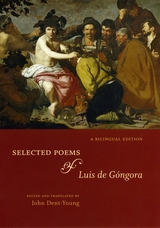 Selected Poems of Luis de Góngora: A Bilingual Edition
Luis de Góngora
University of Chicago Press, 2007 Making Luis de Góngora’s work available to contemporary English-language readers without denying his historical context, Selected Poems of Luis de Góngora presents him as not only one of the greatest and most complex poets of his time, but also the funniest and most charismatic. From longer works, such as “The Fable of Polyphemus and Galatea,” to shorter ballads, songs, and sonnets, John Dent-Young’s free translations capture Góngora’s intensely musical voice and transmit the individuality and self-assuredness of the poet. Substantial introductions and extensive notes provide personal and historical context, explain the ubiquitous puns and erotic innuendo, and discuss translation choices. A significant edition of this seminal and challenging poet, Selected Poems of Luis de Góngora will find an eager audience among students of poetry and scholars studying the history and literature of Spain.
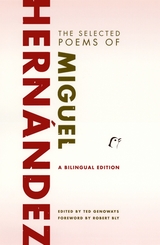 The Selected Poems of Miguel Hernandez: A Bilingual Edition
Miguel Hernández
University of Chicago Press, 2001 In the Spanish-speaking world, Miguel Hernández is regarded as one of the most important poets of the twentieth century-equal in distinction to Federico García Lorca, Pablo Neruda, and Octavio Paz. He has never received his just acclaim, however, in the English-speaking world, a victim of the artistic oppression exercised during the period of Francisco Franco's totalitarian regime. Determined to silence the writer Neruda fondly referred to as his "wonderful boy," Franco sentenced Hernández to death, citing as his crime only that he was "poet and soldier to the mother country." Despite the fact that complete and accurate versions of his work were difficult to obtain even in Spanish for nearly fifty years, Hernández went on to achieve legendary status.
Now, for the first time, Ted Genoways makes Hernández's extraordinary oeuvre available in an authoritative bilingual edition. Featuring some of the most tender and vigorous poetry on war, death, and social injustice written in the past century, nearly half of the poems in this volume appear in English for the first time, making it the most comprehensive bilingual collection of Hernández's work available. Arranged chronologically, The Selected Poems of Miguel Hernández presents Hernández's remarkable emotional range as well as his stylistic evolution from the Romantic shepherd poet to poet of the prison cell. Thorough annotations and introductory essays illuminate the biographical basis for many of Hernández's poems, while a foreword by Robert Bly and an afterword by Octavio Paz provide a striking frame for the work of this essential poet.
"What a victory it is to watch springing forth from our murky thicket of half-commercialized poetry the silver boar of Hernández's words-to see the world of paper part so as to allow the language tusks and shoulders to emerge, shining, pressed forward by his genius. This generous selection of Miguel Hernández's work, arranged, shepherded, and largely translated by Ted Genoways, is an immense gift for which all of us should be grateful."-from the Foreword by Robert Bly
"To gather Hernández's poetry in such a large volume is to bring one of the 20th century's most important poets to life again. Without Hernandez, the world community of poetry would not be what it is today. The Selected Poems must be read if vital poetry is to continue another 100 years, with Hernández's voice as a cherished example of why great poetry is timeless."—Ray González, Bloomsbury Review
"As Philip Levine write in The Kenyon Review, Hernández is 'one of the great talents of the century,' and this collection is a good place to discover (or rediscover) his moving verses."—Virginia Quarterly Review
"Vivid, often volatile imagery describes wrenching emotions and events in The Selected Poems of Miguel Hernández: A Bilingual Edition. . . . Raw, passionate, despairing and celebratory, these poems are a true discovery."—Publishers Weekly
"Arranged in three chronological sections, the poems presented are not the complete works, but they are a large and representative sampling of the best. This is certainly the most comprehensive bilingual edition of Hernández's poetry available. In addition to the poems, the editor includes eight illustrations, important prefatory materials, and a short list of references, and an epilogue by Octavio Paz."—Choice
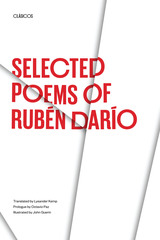 Selected Poems of Rubén Darío
By Rubén Darío
University of Texas Press, 1965 Toward the close of the last century, the poetry of the Spanish-speaking world was pallid, feeble, almost a corpse. It needed new life and a new direction. The exotic, erratic, revolutionary poet who changed the course of Spanish poetry and brought it into the mainstream of twentieth-century Modernism was Félix Rubén García Sarmiento (1867-1916) of Nicaragua, who called himself Rubén Darío. Since its original publication in 1965, this edition of Darío's poetry has made English-speaking readers better acquainted with the poet who, as Enrique Anderson Imbert said, "divides literary history into 'before' and 'after.'" The selection of poems is intended to represent the whole range of Darío's verse, from the stinging little poems of Thistles to the dark, brooding lines of Songs of the Argentine and Other Poems. Also included, in the Epilogue, is a transcript of a radio dialogue between two other major poets, Federico García Lorca of Spain and Pablo Neruda of Chile, who celebrate the rich legacy of Rubén Darío.
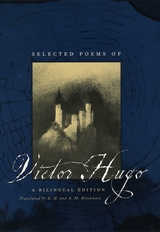 Selected Poems of Victor Hugo: A Bilingual Edition
Victor Hugo
University of Chicago Press, 2001 A remarkable bilingual edition of the best poetry written by the legendary author of Les Miserables
Although best known as the author of Notre Dame de Paris and Les Misérables, Victor Hugo was primarily a poet—one of the most important and prolific in French history. Despite his renown, however, there are few comprehensive collections of his verse available and even fewer translated editions.
Translators E. H. and A. M. Blackmore have collected Victor Hugo's essential verse into a single, bilingual volume that showcases all the facets of Hugo's oeuvre, including intimate love poems, satires against the political establishment, serene meditations, religious verse, and narrative poems illustrating his mastery of the art of storytelling and his abiding concern for the social issues of his time. More than half of this volume's eight thousand lines of verse appear here for the first time in English, providing readers with a new perspective on each of the fascinating periods of Hugo's career and aspects of his style. Introductions to each section guide the reader through the stages of Hugo's writing, while notes on individual poems provide information not found in even the most detailed French-language editions.
Illustrated with Hugo's own paintings and drawings, this lucid translation pays homage to this towering figure of nineteenth-century literature by capturing the energy of his poetry, the drama and satirical force of his language, and the visionary beauty of his writing as a whole.
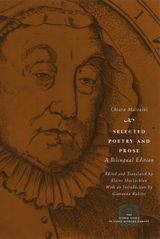 Selected Poetry and Prose: A Bilingual Edition
Chiara Matraini
University of Chicago Press, 2007 Chiara Matraini (1515–1604?) was a member of the great flowering of poetic imitators and innovators in the Italian literary heritage begun by Petrarch, cultivated later by the lyric poet Pietro Bembo, and supplanted by the epic poet Torquato Tasso. Though without formal training, Matraini excelled in a number of literary genres popular at the time—poetry, religious meditation, discourse, and dialogue. In her midlife, she published a collection of erotic love poetry, but later in life her work shifted toward a search for spiritual salvation. Near the end of her life, she published a new poetry retrospective.
Mostly available in only a handful of rare book collections, her writings are now adeptly translated here for an English-speaking audience and situated historically in an introduction by noted Matraini expert Giovanna Rabitti. Selected Poetry and Prose allows the poet to finally take her place as one of the seminal authors of the Renaissance, next to her contemporaries Vittoria Colonna and Laura Battiferra, also published in the Other Voice series.
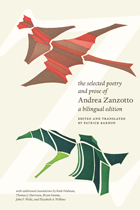 The Selected Poetry and Prose of Andrea Zanzotto: A Bilingual Edition
Andrea Zanzotto
University of Chicago Press, 2007 Andrea Zanzotto is widely considered Italy’s most influential living poet. The first comprehensive collection in thirty years to translate this master European poet for an English-speaking audience, The Selected Poetry and Prose of Andrea Zanzotto includes the very best poems from fourteen of his major books of verse and a selection of thirteen essays that helps illuminate themes in his poetry as well as elucidate key theoretical underpinnings of his thought. Assembled with the collaboration of Zanzotto himself and featuring a critical introduction, thorough annotations, and a generous selection of photographs and art, this volume brings an Italian master to vivid life for American readers. “Now, in [this book], American readers can get a just sense of [Zanzotto’s] true range and extraordinary originality.”—Eric Ormsby, New York Sun “What I love here is the sense of a voice directly speaking. Throughout these translations, indeed from early to late, the great achievement seems to be the way they achieve a sense of urgent address.”—Eamon Grennan, American Poet
The Selected Poetry and Prose of Vittorio Sereni: A Bilingual Edition
Vittorio Sereni
University of Chicago Press, 2006
One of the most important Italian poets of the last century, Vittorio Sereni (1913–83) wrote with a historical awareness unlike that of any of his contemporaries. A poet of both personal and political responsibility, his work sensitively explores life under fascism, military defeat and imprisonment, and the resurgence of extreme right-wing politics, as well as the roles played by love and friendship in the survival of humanity.
The first substantial translation of Sereni’s oeuvre published anywhere in the world, The Selected Poetry and Prose of Vittorio Sereni is a unique guide to this twentieth-century poet. A bilingual edition, reissued in paperback for the poet’s centenary, it collects Sereni’s poems, criticism, and short fiction with a full chronology, commentary, bibliography, and learned introduction by British poet and scholar Peter Robinson.
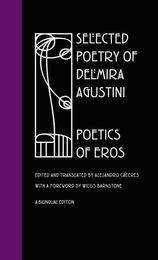 Selected Poetry of Delmira Agustini: Poetics of Eros
Edited and Translated by Alejandro Cáceres. Foreword by Willis Barnstone.
Southern Illinois University Press, 2008 This graceful translation and bilingual edition, now in paperback, is the first to bring English readers a representative sampling of the poetry Delmira Agustini published before her untimely death on July 6, 1914 at the age of twenty-seven. Translated by native Uruguayan Alejandro Cáceres and including work from each of Agustini's four published books, Selected Poetry of Delmira Agustini: Poetics of Eros is a response to a resurgent interest not just in the poems but in the passionate and daring woman behind them and the social and political world she inhabited. Delmira Agustini was born in Montevideo, Uruguay, on October 24, 1886 to wealthy parents of German and Italian descent. She published her first volume of poetry when she was twenty-one and followed with two more in the next six years: the fourth volume was a posthumous publication. Her life was cut short in 1914, when Enrique Job Reyes, her ex-husband, shot her to death and then turned the gun on himself. Carefully selected for this bilingual, en face edition, the poems collected here track and highlight Agustini's development and strengths as an artist—including her methods of experimentation, first relying on modernista forms and later abandoning them—and her focus on the figure of the male, which she portrays as the crux of devotion and attention but deems ultimately unreachable. Cáceres's introduction presents biographical information and situates Agustini's work and life in a larger political, historical, and literary context, particularly the modernismo movement, whose followers broke linguistic and political ties with the pathos and excesses of romanticism.
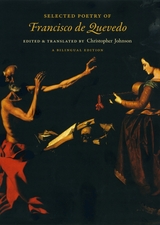 Selected Poetry of Francisco de Quevedo: A Bilingual Edition
Francisco de Quevedo
University of Chicago Press, 2009 Francisco de Quevedo (1580–1645), one of the greatest poets of the Spanish Golden Age, was the master of the baroque style known as “conceptismo,” a complex form of expression fueled by elaborate conceits and constant wordplay as well as ethical and philosophical concerns. Although scattered translations of his works have appeared in English, there is currently no comprehensive collection available that samples each of the genres in which Quevedo excelled—metaphysical and moral poetry, grave elegies and moving epitaphs, amorous sonnets and melancholic psalms, playful romances and profane burlesques. In this book, Christopher Johnson gathers together a generous selection of forty-six poems—in bilingual Spanish-English format on facing pages—that highlights the range of Quevedo’s technical expertise and themes. Johnson’s ingenious solutions to rendering the difficult seventeenth-century Spanish into poetic English will be invaluable to students and scholars of European history, literature, and translation, as well as poetry lovers wishing to reacquaint themselves with an old master.
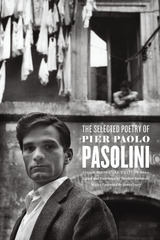 The Selected Poetry of Pier Paolo Pasolini: A Bilingual Edition
Pier Paolo Pasolini
University of Chicago Press, 2014 A rich selection of the remarkably diverse and powerful verse of the legendary filmmaker
Most people outside Italy know Pier Paolo Pasolini for his films, many of which began as literary works—Arabian Nights, The Gospel According to Matthew, The Decameron, and The Canterbury Tales among them. What most people are not aware of is that he was primarily a poet, publishing nineteen books of poems during his lifetime, as well as a visual artist, novelist, playwright, and journalist. Half a dozen of these books have been excerpted and published in English over the years, but even if one were to read all of those, the wide range of poetic styles and subjects that occupied Pasolini during his lifetime would still elude the English-language reader.
For the first time, Anglophones will now be able to discover the many facets of this singular poet. Avoiding the tactics of the slim, idiosyncratic, and aesthetically or politically motivated volumes currently available in English, Stephen Sartarelli has chosen poems from every period of Pasolini’s poetic oeuvre. In doing so, he gives English-language readers a more complete picture of the poet, whose verse ranged from short lyrics to longer poems and extended sequences, and whose themes ran not only to the moral, spiritual, and social spheres but also to the aesthetic and sexual, for which he is most known in the United States today. This volume shows how central poetry was to Pasolini, no matter what else he was doing in his creative life, and how poetry informed all of his work from the visual arts to his political essays to his films. Pier Paolo Pasolini was “a poet of the cinema,” as James Ivory says in the book’s foreword, who “left a trove of words on paper that can live on as the fast-deteriorating images he created on celluloid cannot.”
This generous selection of poems will be welcomed by poetry lovers and film buffs alike and will be an event in American letters.
Selected Poetry, Prose, and Translations, with Contextual Materials
Anne Vaughan Lock
Iter Press, 2021 Born to merchant-class parents who served in the court of Henry VIII and his queens, Anne Vaughan Lock lived in London and Exeter, spent time in Geneva as a religious exile, belonged to the Cooke sisters’ political-religious circle, maintained friendships with prominent Protestant leaders, and engaged the issues of her day. As a recognized public figure, she took on the roles of reformer, poet, translator, correspondent, spiritual counselor, and political advocate. During her lifetime, she published two books, both of which were reprinted several times.
This volume provides a collection of Lock’s works presented in modern spelling, and it includes additional contemporary materials that place her voice in the larger context of the Tudor period, offering insight into the intertwined complexities of political, social, and religious life in sixteenth-century England.
Selected Political Writings: The Great Moving Right Show and Other Essays
Stuart Hall
Duke University Press, 2017 Selected Political Writings gathers Stuart Hall's best-known and most important essays that directly engage with political issues. Written between 1957 and 2011 and appearing in publications such as New Left Review and Marxism Today, these twenty essays span the whole of Hall's career, from his early involvement with the New Left, to his critique of Thatcherism, to his later focus on neoliberalism. Whether addressing economic decline and class struggle, the Cuban Missile Crisis, or the politics of empire, Hall's singular commentary and theorizations make this volume essential for anyone interested in the politics of the last sixty years.
Selected Prose
John Hamilton Reynolds
Harvard University Press John Hamilton Reynolds, poet, critic, satirist, and essayist, has been principally known as a friend of Keats. Until now his prose has lain unretrieved and unread in nineteenth-century periodicals. This volume, comprising a wide selection of Reynolds's work, presents a long overdue opportunity to assess the accomplishments of an important but neglected writer. The editor offers a biographical sketch of Reynolds's life, a critical evaluation of his achievement, information on the journals to which he contributed, explanations of obscure references, and a complete list of Reynolds' writings.
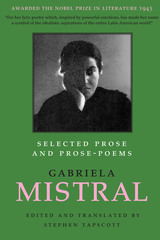 Selected Prose and Prose-Poems
By Gabriela Mistral
University of Texas Press, 2002 The first Latin American to receive a Nobel Prize for Literature, the Chilean writer Gabriela Mistral (1889-1957) is often characterized as a healing, maternal voice who spoke on behalf of women, indigenous peoples, the disenfranchised, children, and the rural poor. She is that political poet and more: a poet of philosophical meditation, self-consciousness, and daring. This is a book full of surprises and paradoxes. The complexity and structural boldness of these prose-poems, especially the female-erotic prose pieces of her first book, make them an important moment in the history of literary modernism in a tradition that runs from Baudelaire, the North American moderns, and the South American postmodernistas. It's a book that will be eye-opening and informative to the general reader as well as to students of gender studies, cultural studies, literary history, and poetry. This Spanish-English bilingual volume gathers the most famous and representative prose writings of Gabriela Mistral, which have not been as readily available to English-only readers as her poetry. The pieces are grouped into four sections. "Fables, Elegies, and Things of the Earth" includes fifteen of Mistral's most accessible prose-poems. "Prose and Prose-Poems from Desolación / Desolation [1922]" presents all the prose from Mistral's first important book. "Lyrical Biographies" are Mistral's poetic meditations on Saint Francis and Sor Juana de la Cruz. "Literary Essays, Journalism, 'Messages'" collects pieces that reveal Mistral's opinions on a wide range of subjects, including the practice of teaching; the writers Alfonso Reyes, Alfonsina Storni, Rainer Maria Rilke, and Pablo Neruda; Mistral's own writing practices; and her social beliefs. Editor/translator Stephen Tapscott rounds out the volume with a chronology of Mistral's life and a brief introduction to her career and prose.
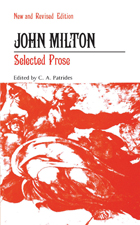 Selected Prose: New and Revised Edition
John Milton, Edited by C. A. Patrides
University of Missouri Press, 1986 Although John Milton is best known for his poems such as Paradise Lost, his prose works, including Areopagitica, The Tenure of Kings, and The Doctrine and Discipline of Divorce, are important in their own right. In this selection of Milton’s prose, C.A. Patrides presents the best possible texts of complete works in a format designed to enable students to understand Milton the thinker as well as to judge for themselves the achievements of Milton the artist in prose. First published in 1974, C.A. Patrides ‘s edition of Milton’s prose has proved invaluable to students and scholars of Renaissance literature because it includes mostly the complete texts of Milton’s prose works. Now, in this new and updated edition, Patrides has revised his introduction and his bibliography to reflect advances in Milton scholarship in the past ten years. In addition, the selections have been expanded to include passages from Milton’s theological treatise De doctrina Christiana.
For sale only in the USA and Philippines.
Selected Prose of N. M. Karamzin
N. M. Karamzin, translated and with an introduction by Henry M. Nebel Jr.
Northwestern University Press, 1969 In Selected Prose of N. M. Karamzin, Henry Nebel’s translation and extensive introductory material presents a collection of primary sources by a Russian author whose tales explore the creative exploitation of sentimentalism’s potentialities.
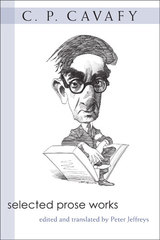 Selected Prose Works
C. P. Cavafy
University of Michigan Press, 2010 "A timely and significant supplement to C. P. Cavafy's poetic canon, the Selected Prose Works, eloquently translated and meticulously annotated by Peter Jeffreys, allows readers yet another creative engagement with the greatest Greek writer since antiquity. Marked by a wide and intriguing range of interests, these writings offer a rich trove for general readers and scholars alike, who from now on will find it difficult to discuss Cavafy's poetry without reference to his prose."
---Vassilis Lambropoulos, C. P. Cavafy Professor of Modern Greek, University of Michigan "Peter Jeffreys gives us a rare gift---access to Constantine Cavafy's prose work. Through his intelligent translation, these texts, which range from literary criticism to personal notes, from essays on the Greek language to the Parthenon marbles, offer unexpected entry into the mind of one of the twentieth century's greatest literary figures. They suggest new ways to think about not only Cavafy's remarkable poetry but also the man himself. An indispensable companion for all who love Cavafy's work."
---Gregory Jusdanis, The Ohio State University "Once you've felt his influence, you won't need telling that Cavafy is unique in his distinctive voice, his quiet humor, and his unassertive culture."
---Frank Kermode, Formerly Lord Northcliffe Professor of Modern English Literature at University College, London, and King Edward VII Professor of English Literature, University of Cambridge Constantine Cavafy (1863–1933) is arguably the most important modern poet of Greece and Greek culture. Long a resident of Egypt and then Constantinople, Cavafy in his poems and prose works tended to focus on Greco-Roman antiquity, on Greece's national identity, and on personal and mythological images and themes including his ethnicity and sexual identity. He wrote some 150 poems, plus a few works in collaboration with his brother John. His poetical works have been much translated and discussed, but until now, very little consideration has been given to his prose works, in part because many remained untranslated from the original Greek. This book collects Cavafy's more interesting prose pieces and translates those that originally appeared in Greek. Of the forty pieces included, only thirteen have previously appeared in print, and of those thirteen only a few were in English. The pieces include essays, "prose poems," short stories, self-assessments, and considerations of other poets, including John Keats. This significant new collection offers a different perspective on the well-known Cavafy. Peter Jeffreys, Assistant Professor of English at Suffolk University in Boston, received a Doctorate in English Literature from the University of Toronto. He is the author of Eastern Questions: Hellenism and Orientalism in the Writings of E.M. Forster and C.P. Cavafy and the editor of The Forster-Cavafy Letters: Friends at a Slight Angle. He is currently working on a bio-critical study of C. P. Cavafy and the decadent tradition. Cover image copyright © David Levine
The Selected Shepherd: Poems
Reginald Shepherd
University of Pittsburgh Press, 2024 Drawing from all six of his collections, The Selected Shepherd offers a new retrospective on the work of an important and sometimes controversial Black, gay poet. Although well known for his erotic poems about white men, Shepherd also wrote consistently about the natural world and its endangerment and his grief over his mother’s death. Presented in both publication order and the order in which they originally appeared within each collection, these poems highlight the most important themes of Shepherd’s work, along with both his predictability and unpredictability as a poet. Jericho Brown’s introduction provides additional context and insight on the life and work of this complex, groundbreaking figure in American poetry.
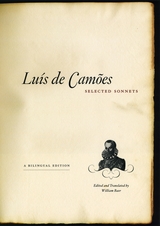 Selected Sonnets: A Bilingual Edition
Luís de Camões
University of Chicago Press, 2005 The most important writer in Portuguese history and one of the preeminent European poets of the early modern era, Luís de Camões (1524–80) has been ranked as a sonneteer on par with Petrarch, Dante, and Shakespeare. Championed by such influential English poets as William Blake and Elizabeth Barrett Browning, and admired in America by Edgar Allan Poe, Henry Wadsworth Longfellow, and Herman Melville, Camões was renowned for his intensely personal sonnets and equally intense adventurous life. He was banished for dueling and brawling at court, lost an eye fighting the Moors in North Africa, was shipwrecked off the coast of India, jailed in Goa, and exiled in Mozambique. Throughout these personal trials, he advanced poetry beyond the Petrarchin model of love won and lost to write of personal despair, history, politics, war, religion, and the natural beauty of Portugal.
The first significant English translation of Camões's sonnets in more than one hundred years, Selected Sonnets: A Bilingual Edition collects seventy of Camões's best—all musically rendered into contemporary, yet metrical and rhymed, English-language poetry by William Baer, with the original Portuguese on facing pages—and reintroduces the genius of a poet whom Cervantes called "the incomparable treasure of Lusus." A comprehensive selection of sonnets that demonstrates the full range of Camões's interests and invention, Selected Sonnets will prove indespensible for both students and teachers in comparative and Renaissance literature, Portuguese and Spanish history, and the art of literary translation.
Selected Stories
Nathaniel Hawthorne
Harvard University Press, 2011 Dark, weird, psychologically complex, Hawthorne’s short fiction continues to fascinate readers. Brenda Wineapple has made a generous selection of Hawthorne’s stories, including some of his best-known tales as well as other, less-often anthologized gems. In her introduction, she explores a writer whose best stories, as Wineapple has elsewhere observed, “penetrate the secret horrors of ordinary life, those interstices in the general routine where suddenly something or someone shifts out of place, changing everything.”
The John Harvard Library edition reproduces the authoritative texts of Hawthorne’s stories in The Centenary Edition of the Works of Nathaniel Hawthorne.
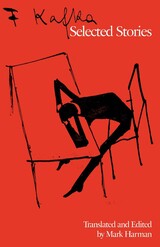 Selected Stories
Franz Kafka
Harvard University Press, 2024 A Spectator Best Book of the Year
“It’s an extremely handsome, well-designed book, and you couldn’t ask for a better introduction to Kafka…If you’ve never read Kafka before or if you already love him, you’ll still want Harman’s Selected Stories.”
—Michael Dirda, The Washington Post
A superb new translation of Kafka’s classic stories, authoritatively annotated and beautifully illustrated.
Selected Stories presents new, exquisite renderings of short works by one of the indisputable masters of the form. Award-winning translator and scholar Mark Harman offers the most sensitive English rendering yet of Franz Kafka’s unique German prose—terse, witty, laden with ambiguities and double meanings. With his in-depth biographical introduction and notes illuminating the stories and placing them in context, Harman breathes new life into masterpieces that have often been misunderstood.
Included are sixteen stories, arranged chronologically to convey a sense of Kafka’s artistic development. Some, like “The Judgment,” “In the Penal Colony,” “A Hunger Artist,” and “The Transformation” (usually, though misleadingly, translated as “The Metamorphosis”), represent the pinnacle of Kafka’s achievement. Accompanying annotations highlight the wordplay and cultural allusions of the original German, pregnant with irony and humor that English readers have often missed.
Although Kafka has frequently been cast as a loner, in part because of his quintessential depictions of modern alienation, he had a number of close companions. Harman draws on Kafka’s diaries, extensive correspondence, and engagement with early twentieth-century debates about Darwinism, psychoanalysis, and Zionism to construct a rich portrait of Kafka in his world. A work of both art and scholarship, Selected Stories transforms our understanding and appreciation of a singular imagination.
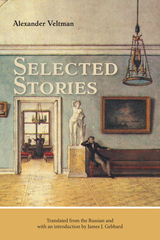 Selected Stories
A. F. Veltman
Northwestern University Press, 2026 Five tales of social satire from a forgotten sensation of nineteenth-century Russian literature
In 1830s and ’40s Russia, A. F. Veltman’s eccentric writings were a fixture on the bookshelves of the reading public. In his era, his work influenced writers including Pushkin, Gogol, and Dostoevsky. The five stories collected here, united by themes of social satire, display Veltman’s characteristic pivots between the tragic, comic, and grotesque.
“Erotida” riffs on the genre of the society tale with linguistic puns and a bizarre plot resolution. In “Roland the Furious,” provincial officials mistake a traveler for a high-ranking government functionary. “Travel Impressions, and, among Other Things, a Pot of Geraniums” plays on the travelogue genre and includes what may be the first description in Russian literature of journey by railroad. “A Traveler from the Provinces; or, A Commotion in the Capital” parodies the Moscow literary salons of Veltman’s day. Finally, “It’s Not a House, but a Plaything!” toys with yet another storytelling convention of the time—the Russian folkloric tradition of “house spirits.”
Selected Topics in Advanced Solid State and Fibre Optic Sensors
S.M. Vaezi-Nejad
The Institution of Engineering and Technology, 2000 New techniques and technologies for sensors are developing fast and being applied in a wide range of fields for measurement and instrumentation, both for research and commercial purposes. This book aims to provide advanced students and practising engineers with a selective tour of highlights in the topical field of sensors for measurement. The authors provide descriptions of the operation, characteristics and applications of the sensors on which they work, together with recent advances and prospects for the future. The chapters cover both fibre optic and solid state sensing, applied across a wide range of applications.
Selected Topics on Polynomials
Andrzej Schinzel
University of Michigan Press, 1982 Complete proofs of both new results and original work on polynomials and Diophantine equations are presented here for the first time in book form. Although the results are technical, they will be of interest to algebraists and those interested in algebraic number theory.
Selected Translations: 2000-2020
Ilan Stavans
University of Pittsburgh Press, 2021 For twenty years, Ilan Stavans has been translating poetry from Spanish, Yiddish, Hebrew, French, Portuguese, Russian, German, Georgian, and other languages. His versions of Borges, Neruda, Sor Juana Inés de la Cruz, Ferreira Gullar, Raúl Zurita, and dozens of others have become classics. This volume, which includes poems from more than forty poets from all over the world, is testimony to a life dedicated to the pursuit of beauty through poetry in different languages.
Selected Works
Fulgentius
Catholic University of America Press, 1997 This volume gives English readers for the first time an opportunity to study a representative selection of the writings of this early sixth-century author. It also presents Fulgentius's biography, the Life, for the first time in English.
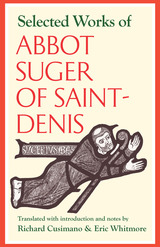 Selected Works of Abbot Suger of Saint Denis
Abbot Suger of Saint-Denis
Catholic University of America Press, 2018 Translated with Introduction and Notes by Richard Cusimano and Eric Whitmore
Suger, the twelfth century abbot of Saint-Denis, has not received the respect and attention that he deserves. Bernard of Clairvaux and Peter the Venerable have garnered more attention, and students of medieval history know their names well. In one respect, however, Suger has earned due praise, for his architectural innovations to the church of Saint-Denis made it truly one of the most beautiful churches in Europe.
Students of history and architecture know Suger best for his work on Saint-Denis, the burial site of medieval French kings, queens, and nobility. The abbot enlarged, decorated, improved, and redesigned the building so beautifully that it is safe to say that he became the foremost church architect of twelfth-century France.
The man, however, was so much more than an architect. He served as a counselor and member of the courts of King Louis VI and VII, who sent him across Europe on diplomatic missions. He represented those kings at the papal curia and imperial diets. He was also a close friends and confidante of King Henry I of England, whom he often visited on behalf of French royal interests.
Never shy, Suger seems almost obsessed that his works and deeds not be forgotten. He acquired numerous properties and estates for his abbey, as well as improved the ones it already possessed. He built new buildings, barns, walls for villages, and increased the return of grain from all the abbey’s lands. Readers interested in the medieval agricultural system and way of life will also enjoy these texts.
Suger’s texts also provide a wealth of information about the events of his era as well as a large amount of biographical material on his accomplishments. This translation of his writings intends to enhance his reputation and make his name better known by students at all levels and among those interested in medieval topics.
 Selected Works of Abbot Suger of Saint-Denis: Letters and Charters
Abbot Suger of Saint-Denis
Catholic University of America Press, 2025 Abbot Suger of Saint-Denis was a pivotal figure in 12th-century France, leaving a lasting impact through his multifaceted foles. His dedication to his abbey of Saint-Denis, wise counsel to kings, mediation of church disputes, and involvement in the Crusades solidify his legacy. His letters and charters offer invaluable insights into the political, religious, and economic landscape of the era, particularly during the Capetian dynasty's formative years. Suger's letters, often addressed to powerful figures, reveal his adept political maneuvering. They document his efforts to consolidate royal authority, maintain peace, and defend the abbey's interests. These writings illuminate medieval diplomacy and the Church's influence on secular affairs. Suger served as a trusted advisor to Kings Louis VI and Louis VII, even acting as regent during the latter's absence on the Second Crusade. He skillfully resolved conflicts among ecclesiastical figures, bolstering royal authority and promoting church unity. Suger's charters meticulously detail the abbey's landholdings, privileges, and administrative practices, reflecting his commitment to restoring its wealth and prestige and protecting the abbey's lands from encroachment. These documents also provide crucial information about the economic and social conditions of 12th-century France, a pivotal period in the development of the French monarchy.
 Selected Works of Herbert Blumer: A PUBLIC PHILOSOPHY FOR MASS SOCIETY
Edited, with Critical Commentary and an Afterword, by Stanford M. Lyman and Arthur J. Vidich
University of Illinois Press, 1988 The civic sociology of Herbert Blumer speaks to the fundamental problem of modernity: how freedom and equity can be ensured when institutional and personal relations are threatened by disparate groups and factions--in short, by difference.
Balancing essays on Herbert Blumer with Blumer's own writings on race relations, labor and management conflict, urbanization, and popular culture, this volume--originally published as Social Order and the Public Philosophy--establishes Blumer's thought as a basis for a public policy that remains faithful to the essential character of human life in a permanently pluralized and segmented society.
Stanford M. Lyman and Arthur J. Vidich situate Blumer's ideas in the context of earlier public philosophers, such as William Graham Sumner, Herbert Croly, and Walter Lippmann. They consider the implications of Blumer's works for America's most pressing social issues and propose a sophisticated civic sociology of their own based on his studies and methods. Their new afterword affirms the rich harvest Blumer's philosophy continues to yield for postmodern society.
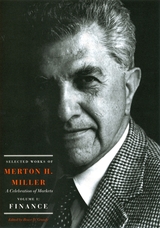 Selected Works of Merton H. Miller: A Celebration of Markets: Volume 1: Finance
Merton H. Miller
University of Chicago Press, 2002 Widely regarded as one of the founders of modern corporate finance, Merton H. Miller was awarded a Nobel Prize in 1990 for his work in the theory of finance and financial economics. Selected Works of Merton H. Miller gathers together in two volumes a selection of Miller's most influential contributions over more than fifty years of active research. A common theme running throughout both volumes is Miller's conviction about the utility of market-based approaches to topics as diverse as dividend policy, bank regulation, the structure of securities markets, and competition between research universities and teaching colleges.
Miller was perhaps best known for a series of highly influential papers he cowrote in the 1950s and 1960s with fellow Nobel laureate Franco Modigliani that advanced a set of capital structure theorems later dubbed the "M and M propositions." In brief, the M and M propositions state that the actions of investors, firms, and capital markets will cause the market value of a firm to be independent of its capital structure. In other words, a corporation's value depends on its investments in people, ideas, and physical capital goods and not on the mix of bonds, stocks, and other securities used to finance the investments. Four of these papers are reprinted here, together with important later work by Miller in macroeconomics, corporate capital structure, management science, asset pricing, and the economic and regulatory problems of the financial services industry.
Diverse and innovative, the papers in Selected Works of Merton H. Miller will interest students and practitioners of economics, finance, and business, as well as policymakers responsible for market regulation.
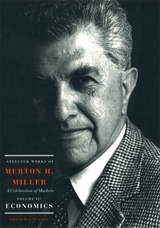 Selected Works of Merton H. Miller: A Celebration of Markets: Volume 2: Economics
Merton H. Miller
University of Chicago Press, 2002 Widely regarded as one of the founders of modern corporate finance, Merton H. Miller was awarded a Nobel Prize in 1990 for his work in the theory of finance and financial economics. Selected Works of Merton H. Miller gathers together in two volumes a selection of Miller's most influential contributions over more than fifty years of active research. A common theme running throughout both volumes is Miller's conviction about the utility of market-based approaches to topics as diverse as dividend policy, bank regulation, the structure of securities markets, and competition between research universities and teaching colleges.
Miller was perhaps best known for a series of highly influential papers he cowrote in the 1950s and 1960s with fellow Nobel laureate Franco Modigliani that advanced a set of capital structure theorems later dubbed the "M and M propositions." In brief, the M and M propositions state that the actions of investors, firms, and capital markets will cause the market value of a firm to be independent of its capital structure. In other words, a corporation's value depends on its investments in people, ideas, and physical capital goods and not on the mix of bonds, stocks, and other securities used to finance the investments. Four of these papers are reprinted here, together with important later work by Miller in macroeconomics, corporate capital structure, management science, asset pricing, and the economic and regulatory problems of the financial services industry.
Diverse and innovative, the papers in Selected Works of Merton H. Miller will interest students and practitioners of economics, finance, and business, as well as policymakers responsible for market regulation.
Selected Writings
George Herbert Mead
University of Chicago Press, 1964 The only collection of Mead's writings published during his lifetime, these essays have heretofore been virtually inaccessible. Reck has collected twenty-five essays representing the full range and depth of Mead's thought. This penetrating volume will be of interest to those in philosophy, sociology, and social psychology.
"The editor's well-organized introduction supplies an excellent outline of this system in its development. In view of the scattered sources from which these writings are gathered, it is a great service that this volume renders not only to students of Mead, but to historians."—H. W. Schneider, Journal of the History of Philosophy
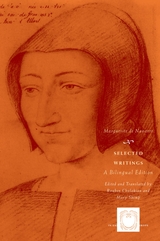 Selected Writings: A Bilingual Edition
Marguerite de Navarre
University of Chicago Press, 2008 Marguerite de Navarre (1492–1549) was the sister and wife to kings and a pivotal influence in sixteenth-century France. An astute politician and diligent humanist, she was a champion of gender equality and the evangelical reform movement, which recognized that the clergy was more concerned with maintaining the church’s power than ministering to the faithful. As the years passed and the glitter of life at court waned, however, Marguerite came to realize her true vocation: writing.
Selected Writings brings together a representative sampling of Marguerite’s varied writings, most of it never before translated into English, enabling Anglophone readers to enjoy the full breadth of her work for the first time. From verse letters and fables to mythological-pastoral tales, from spiritual songs to a selection of novellas from the Heptameron, the wide range of works included here will reveal Marguerite de Navarre to be one of the most important writers—male or female—of sixteenth-century France.
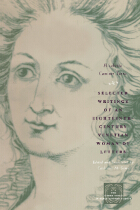 Selected Writings of an Eighteenth-Century Venetian Woman of Letters
Elisabetta Caminer Turra
University of Chicago Press, 2003 Elisabetta Caminer Turra (1751-96) was one of the most prominent women in eighteenth-century Italy and a central figure in the international "Republic of Letters." A journalist and publisher, Caminer participated in important debates on capital punishment, freedom of the press, and the abuse of clerical power. She also helped spread Enlightenment ideas into Italy by promoting and publishing Voltaire's latest works and translating new European plays-plays she herself directed, to great applause, on Venetian stages.
Bringing together Caminer's letters, poems, and journalistic writings, nearly all published for the first time here, Selected Writings offers readers an intellectual biography of this remarkable figure as well as a glimpse into her intimate correspondence with the most prominent thinkers of her day. But more important, Selected Writings provides insight into the passion that animated Caminer's fervent reflections on the complex and shifting condition of women in her society-the same passion that pushed her to succeed in the male-dominated literary professions.
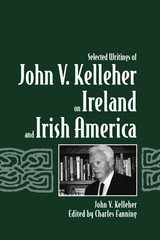 Selected Writings of John V. Kelleher on Ireland and Irish America
John V. Kelleher. Edited by Charles Fanning
Southern Illinois University Press, 2002
A collection of eighteen critical essays and twenty-six translations spanning the career of one of the founding intellects of Irish Studies, the Selected Writings of John V. Kelleher on Ireland and Irish America consists of five accessible sections. The first gathers Kelleher’s essays on the most widely known Irish cultural phenomenon—the literary renaissance of the early twentieth century. Part two contains his judicious assessments of Irish literature in its post-Revolutionary phase. The third section includes Kelleher’s insightful essays on the experience of the Irish in America. The fourth section contains essays that examine early Irish literature and culture, opening with a benchmark essay for Irish Studies, “Early Irish History and Pseudo-History,” which was read at the inaugural meeting of the American Conference for Irish Studies in 1961. The collection concludes with Kelleher’s translations and adaptations of poems in Old, Middle, and Modern Irish, illustrating his command of the language at every stage.
The Selected Writings of John Witherspoon
Edited by Thomas P. Miller
Southern Illinois University Press, 1990 Considered the first significant teacher of rhetoric in America, John Witherspoon also introduced Scottish moral philosophy to this country and as president of Princeton University reformed the curriculum to give emphasis to both studies. He was an active pamphleteer on religious and political issues and a signer of the Declaration of Independence. Editor Thomas P. Miller argues that Witherspoon’s career exemplifies the Ciceronian ideal, and the eight selections Miller presents from the 1802 American edition of the Works corroborate that claim. This paperback edition includes a new preface by the editor that surveys the scholarship published on Witherspoon over the past twenty-five years and discusses how Miller’s own perspective on Witherspoon has changed during that time.
 Selected Writings of Richard McKeon: Volume One: Philosophy, Science, and Culture
Richard McKeon
University of Chicago Press, 1998 Richard McKeon enjoys an enviable reputation as an erudite historian of ideas and exegete of philosophic texts. However, the originality and scope of his achievement as a systematic philosopher are less widely known. In this ambitious three-volume edition, of which Philosophy, Science, and Culture is the first, a selection of McKeon's writings will be collected to showcase his distinctive approach to the analysis of discourse. Volume I covers philosophic theory through his writings on first philosophy (metaphysics) and the methods and principles of the sciences, Volume II examines philosophic arts through his writings on aesthetics and forms of discourse as a whole, and Volume III looks at philosophic practice through his writings on world community and the relations of cultures.
Philosophy, Science, and Culture covers topics that range from philosophic semantics to the processes of the sciences to the forms of human rights. This collection makes McKeon's mission as a philosopher unmistakable. He characterized himself as a philosophic pluralist; he was an American philosopher in the tradition of the pragmatists, one whose philosophy subtly resonates with C. S. Peirce and John Dewey. McKeon also explored the themes of deconstructionism and other late-twentieth-century philosophies decades before their popular emergence—but, in generating a matrix of possibilities for productive debate, he avoided both relativism and the entrapments of dogmatism.
An important collection of his writings, this series will establish Richard McKeon as one of the foremost philosophers of the twentieth century.
Richard McKeon (1900-1985) taught philosophy at the University of Chicago from 1935 to 1973, and at the time of his death had published eleven books and 158 articles on an extraordinary array of topics and cultures. Among his many national and international distinctions, he was awarded the highest honor of the American Philosophical Association when he was invited to give the Paul Carus Lectures in New York in 1965.
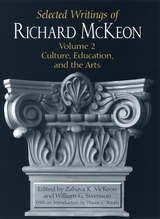 Selected Writings of Richard McKeon, Volume Two: Culture, Education, and the Arts
Richard P. McKeon
University of Chicago Press, 2005 Richard McKeon was a philosopher of extraordinary creativity who brought profoundly original ideas to bear on more standard ways of thinking and learning. A classicist, medievalist, and revolutionary intellectual, he fashioned an approach to philosophy as a plural conversation among varied traditions of thought, epochs, and civilizations. This second volume of McKeon's selected works demonstrates his approach to inquiry and practice in culture, education, and the arts.
Together, the writings in this book show how McKeon reinvented the ancient arts of rhetoric, grammar, logic, and dialectic for the new circumstances of a global culture. In essays on creation and criticism, for instance, rhetoric is distinguished from grammar and shown to be the master art of invention, judgment, and pluralistic interpretation. Writings on themes of culture, meanwhile, explore the self-invention of mankind as justification for the arts, the development of the humanities, and the organization of the sciences. In the closing essays on education and philosophy, McKeon considers the implications of his ideas for the future of the liberal arts and higher learning.
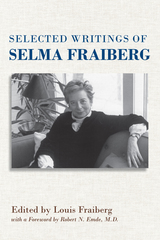 Selected Writings of Selma Fraiberg
Edited by Louis Fraiberg with a Foreword by Robert N. Emde, M.D.
Ohio State University Press, 1987 Social worker, psychoanalyst, and child-development expert Selma Fraiberg’s iconic book, The Magic Years, has influenced generations of caregivers, therapists, and clinicians since its publication in 1959. No less rich are the essays that make up this new, accessibly priced reissue of her Selected Writings. Like The Magic Years, these essays (including her hugely influential “Ghosts in the Nursery”) glean their insights from years of clinical study and contain Fraiberg’s synthesis of and groundbreaking contributions to attachment theory, child psychology, social work, and, through her work with blind children, the experience of disability in infancy and childhood. Clinical rigor paired with attunement to the emotional lives of her subjects was Fraiberg’s hallmark: as her husband Louis writes in his preface to this volume, “Once, when asked how she knew what babies were thinking, she replied, ‘They tell me.’” Lucid and elegantly written, her Selected Writings will remain a valuable resource for new generations of social workers, mental-health professionals, educators, and others who work with young children.
Selected Writings on Agricultural Policy and Economic Analysis
Frederick V. WaughJames P. Houck and Martin E. Abel, Editors
University of Minnesota Press, 1984
Selected Writings on Agricultural Policy and Economic Analysis was first published in
1984. Minnesota Archive Editions uses digital technology to make long-unavailable books once again accessible, and are published unaltered from the original University of Minnesota Press editions.
Selected Writings on Marxism
Stuart Hall
Duke University Press, 2021 Throughout his career Stuart Hall engaged with Marxism in varying ways, actively rethinking it to address the political and cultural exigencies of the moment. This collection of Hall's key writings on Marxism surveys the questions central to his interpretations of and investments in Marxist theory and practice. It includes Hall's readings of canonical texts by Marx and Engels, Gramsci, and Althusser; his exchanges with other prominent thinkers about Marxism; his use of Marxist frameworks to theorize specific cultural phenomena and discourses; and some of his later work in which he distanced himself from his earlier attachments to Marxism. In addition, editor Gregor McLennan's introduction and commentary offer in-depth context and fresh interpretations of Hall's thought. Selected Writings on Marxism demonstrates that grasping Hall's complex relationship to Marxism is central to understanding the corpus of his work.
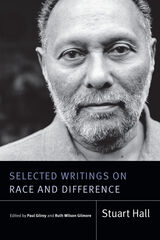 Selected Writings on Race and Difference
Stuart Hall
Duke University Press, 2021 In Selected Writings on Race and Difference, editors Paul Gilroy and Ruth Wilson Gilmore gather more than twenty essays by Stuart Hall that highlight his extensive and groundbreaking engagement with race, representation, identity, difference, and diaspora. Spanning the whole of his career, this collection includes classic theoretical essays such as “The Whites of Their Eyes” (1981) and “Race, the Floating Signifier” (1997). It also features public lectures, political articles, and popular pieces that circulated in periodicals and newspapers, which demonstrate the breadth and depth of Hall's contribution to public discourses of race. Foregrounding how and why the analysis of race and difference should be concrete and not merely descriptive, this collection gives organizers and students of social theory ways to approach the interconnections of race with culture and consciousness, state and society, policing and freedom.
 Selected Writings on Visual Arts and Culture: Detour to the Imaginary
Stuart Hall. Edited by Gilane Tawadros
Duke University Press, 2024 Stuart Hall’s work on culture, politics, race, and media is familiar to readers throughout the world. Equally important was his decades-long commitment to visual art. As the first collection to bring together Hall’s work on the visual, this volume assembles two dozen of Hall’s essays, lectures, reviews, catalog texts, and conversations on art, film, and photography. Providing rare insights into Hall’s engagement with the “radically different” intellectual and aesthetic space of the visual imaginary, these works articulate the importance of the visual as a site of contestation at the same time as it is a space in which Black artists and filmmakers reframe questions about diaspora, identity, and globalization. Selected Writings on Visual Arts and Culture demonstrates the breadth and range of Hall’s thinking on art, film, photography, archives, and museums. In so doing, it enables us to arrive at radical and innovative ways of understanding the world.
 Selected Writings, Volume 1: Toward a New African Art Discourse
Okwui Enwezor. Edited by Terry Smith.
Duke University Press, 2025 Okwui Enwezor is widely regarded as a leader among the brilliant curators who emerged in the 1990s to set agendas for understanding the global expansiveness of contemporary art. Among his pathfinding exhibitions were the second Johannesburg Biennale (1997), the paradigm-shifting Documenta11 (2002), Archive Fever (2008), and Postwar (2016). In addition to breaking ground as a curator, Enwezor was also a prolific critic, essayist, and theorist. Selected Writings—a landmark two-volume set—brings together Enwezor’s most influential and foundational works. Spanning a quarter-century, these selections reflect the depth and breadth of Enwezor’s writing and its role in his tireless efforts to decolonize the art world. Volume 1, Toward a New African Art Discourse, includes fifteen essays written between 1994 and 2006. Drawn from exhibition catalogs, art journals, interviews with artists, art reviews, curatorial statements, historical studies, and book chapters, these texts show him striving to fulfil the first main ambition that drove his career: to found and sustain what he called a “New African Art Discourse.” Demonstrating that his writing helped fulfill this goal, this collection reaffirms Enwezor’s status as a transformational figure in the global contemporary art world.
 Selected Writings, Volume 2: Curating the Postcolonial Condition, Volume 2
Okwui Enwezor. Edited by Terry Smith.
Duke University Press, 2025 Okwui Enwezor is widely regarded as a leader among the brilliant curators who emerged in the 1990s to set agendas for understanding the global expansiveness of contemporary art. Among his pathfinding exhibitions were the second Johannesburg Biennale (1997), the paradigm-shifting Documenta 11 (2002), Archive Fever (2008), and Postwar (2016). In addition to breaking ground as a curator, Enwezor was also a prolific critic, essayist, and theorist. Selected Writings—a landmark two-volume set—brings together Enwezor’s most influential and foundational works. Spanning a quarter-century, these selections reflect the depth and breadth of Enwezor’s writing and its role in his tireless efforts to decolonize the art world. Volume 2, Curating the Postcolonial Condition, includes seventeen essays written between 2006 and 2019. Drawn from exhibition catalogs, art journals, interviews with artists, art reviews, curatorial statements, historical studies, and book chapters, these texts show him striving to fulfil the second main ambition that drove his career: enabling a critical, diasporic imagining of postcoloniality that would become pervasive within global art discourse. Demonstrating that his writing helped fulfill this goal, this collection reaffirms Enwezor’s status as a transformational figure in the global contemporary art world.
 Selecting by Origin: Ethnic Migration in the Liberal State
Christian Joppke
Harvard University Press, 2005 In a world of mutually exclusive nation-states, international migration constitutes a fundamental anomaly. No wonder that such states have been inclined to select migrants according to their origins. The result is ethnic migration.
But Christian Joppke shows that after World War II there has been a trend away from ethnic selectivity and toward non-discriminatory immigration policies across Western states. Indeed, he depicts the modern state in the crossfire of particularistic and universalistic principles and commitments, with universalism gradually winning the upper hand. Thus, the policies that regulate the boundaries of states can no longer invoke the particularisms that constitute these boundaries and the collectivities residing within them.
Joppke presents detailed case studies of the United States, Australia, Western Europe, and Israel. His book will be of interest to a broad audience of sociologists, political scientists, historians, legal scholars, and area specialists.
Selecting Women, Electing Women: Political Representation and Candidate Selection in Latin America
Magda Hinojosa
Temple University Press, 2012 Selecting Women, Electing Women is a groundbreaking book that examines how the rules for candidate selection affect women’s political representation in Latin America. Focusing particularly on Chile and Mexico, Magda Hinojosa presents counterintuitive assumptions about factors that promote the election of women. She argues that primaries—which are regularly thought of as the most democratic process for choosing candidates—actually produce fewer female nominees than centralized and seemingly exclusionary candidate selection procedures. Hinojosa astutely points out the role of candidate selection processes in explaining variation in women’s representation that exists both across and within political parties. Selecting Women, Electing Women makes critical inroads to the study of gender and politics, candidate selection, and Latin American politics.
 A Selection of Cases and Materials on the Law of Contracts
George Knowles Gardner
Harvard University Press The materials of this case-book are, in the main, familiar; but they have been organized upon a novel plan. Starting with the medieval actions of debt and covenant, the book traces the evolution of the ideas underlying these two actions through the more flexible action of assumption to the form which they have assumed in modern law. It next deals with the interpretation of both formal and informal contracts, with the remedies of specific performance, damages, and rescission, with the all-pervasive policy against forfeitures, and finally with the methods by which contract obligations may be altered or released. After contracts involving two parties only have been thus examined, the book proceeds to contracts which involve three parties, including promises for the benefit of strangers, assignments, and promises addressed in general terms to persons to be thereafter ascertained. There is a final chapter on illegal contracts. The book was prepared with an eye to the revised curriculum announced in the 1938 catalogue of the Harvard Law School, and with the hope that it would serve as an effective introduction to later courses in the fields of commercial, banking, and insurance law.
A Selection of Modernized Recipes from Food in the Civil War: The North
Jennifer Billock
Michigan State University Press, 2015 As companions to the first and second volumes in the American Food in History series we offer selections of recipes, updated and tested by food editor Jennifer Billock, using measurements and techniques that modern readers can use in their own kitchen. Arranged by main meal occasions (breakfast, picnic or lunch, dinner, dessert) these recipes—some familiar, some curious, all intriguing—will allow family and friends to get a “taste of the times” with their own “Civil War era” meals. The original versions of these recipes (and many more) can be found in Food in the Civil War Era: The North and Food in the Civil War Era: The South, edited by Helen Zoe Veit, along with fascinating essays about the history and the times.
A Selection of Modernized Recipes from Food in the Civil War: The South
Jennifer Billock
Michigan State University Press, 2015 As companions to the first and second volumes in the American Food in History series we offer selections of recipes, updated and tested by food editor Jennifer Billock, using measurements and techniques that modern readers can use in their own kitchen. Arranged by main meal occasions (breakfast, picnic or lunch, dinner, dessert) these recipes—some familiar, some curious, all intriguing—will allow family and friends to get a “taste of the times” with their own “Civil War era” meals. The original versions of these recipes (and many more) can be found in Food in the Civil War Era: The North and Food in the Civil War Era: The South, edited by Helen Zoe Veit, along with fascinating essays about the history and the times.
A Selection of the Poems of Sir Constantijn Huygens (1596-1687): Revised, Second Edition
Edited by Peter Davidson and Adriaan van der Weel
Amsterdam University Press, 2015 Dutch Golden Age poet Constantijn Huygens (1596—1687) was a remarkable figure: in addition to writing poetry, he composed music; was secretary to two Princes of Orange, Frederick Henry and William II; and became a friend to John Donne, Rembrandt, Descartes, and many other notable people of his time. In this book, Peter Davidson and Adriaan van der Weel offer a broad selection of Huygens’s poems and provide excellent translations for those written in Dutch, Latin, and a number of other languages“revealing both Huygens’s literary talent and his remarkable linguistic range.
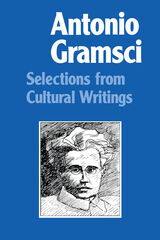 Selections from Cultural Writings
Antonio Gramsci
Harvard University Press, 1985 Though he died as Benito Mussolini's prisoner, leaving only newspaper articles and fragmentary notes, Antonio Gramsci is now seen as the most significant Marxist thinker since Lenin. This volume is the first English translation of his writings on culture, organically and coherently edited from his journalism and his Prison Notebooks.
Gramsci writes about the popular and the great artists from Jules Verne to Dante, but not as so many timeless monuments. He sees artworks in the context of their reception and their absorption in particular cultures and histories. He is sensitive to the politics of culture as well as to the demands of philological scholarship, as his superb work on Dante in this volume shows. We have in this book Gramsci's changing views on particular literary movements and authors, as well as his ideas on the nature of proletarian and popular cultural criticism. Throughout he is concerned with cultural analysis and strategy rather than literary criticism by itself. The headnotes and footnotes prepared by Forgacs and Nowell-Smith address themselves both to the circumstances surrounding the composition of each segment and to the central problems of contemporary Gramsci scholarship. Antonio Gramsci is the twentieth-century writer who has most brilliantly and suggestively explored the ties that bind culture and politics. The publication of this collection is an event of major significance for theorists of all sorts.
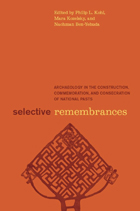 Selective Remembrances: Archaeology in the Construction, Commemoration, and Consecration of National Pasts
Edited by Philip L. Kohl, Mara Kozelsky, and Nachman Ben-Yehuda
University of Chicago Press, 2008 When political geography changes, how do reorganized or newly formed states justify their rule and create a sense of shared history for their people? Often, the essays in Selective Remembrances reveal, they turn to archaeology, employing the field and its findings to develop nationalistic feelings and forge legitimate distinctive national identities.
Examining such relatively new or reconfigured nation-states as Iran, Iraq, Turkey, Israel, Russia, Ukraine, India, and Thailand, Selective Remembrances shows how states invoke the remote past to extol the glories of specific peoples or prove claims to ancestral homelands. Religion has long played a key role in such efforts, and the contributors take care to demonstrate the tendency of many people, including archaeologists themselves, to view the world through a religious lens—which can be exploited by new regimes to suppress objective study of the past and justify contemporary political actions.
The wide geographic and intellectual range of the essays in Selective Remembrances will make it a seminal text for archaeologists and historians.
Selective Service and American Society
Roger William Little
Russell Sage Foundation, 1969 A penetrating analysis of the Selective Service System: its recruiting services, the makeup and attitude of those who serve on local draft boards, the criteria for deferment or rejection from service, and the application of the principle of universality in the present draft laws. Using data from several sources, the study also explores the position of blacks with respect to military service. Comprehensive recommendations are set forth.
Selectivity And Discord: Two Problems Of Experiment
Allan Franklin
University of Pittsburgh Press, 2002
Selectivity and Discord addresses the fundamental question of whether there are grounds for belief in experimental results. Specifically, Allan Franklin is concerned with two problems in the use of experimental results in science: selectivity of data or analysis procedures and the resolution of discordant results.
By means of detailed case studies of episodes from the history of modern physics, Franklin shows how these problems can be—and are—solved in the normal practice of science and, therefore, that experimental results may be legitimately used as a basis for scientific knowledge.
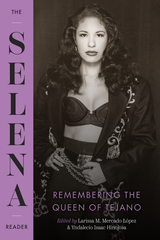 The Selena Reader: Remembering the Queen of Tejano
Edited by Larissa M. Mercado-López and Yndalecio Isaac Hinojosa
University of Texas Press, 2026 A literary collection honoring and memorializing Selena, the Queen of Tejano. Thirty years after her death, Selena Quintanilla-Pérez remains a cherished figure of Mexican American popular culture, her music and celebrity resounding across the decades. This unique collection of creative and scholarly works traces Selena’s lasting impact as an entertainer and focal point of community and identity. Assembling essays, memoir, short stories, and poems, The Selena Reader memorializes a beloved singer while also exploring the politics and personal meaning of what we remember. Selena’s eloquent admirers tell us what they took from her lyrics and stage presence, the official and fan tributes, and the media and products she inspired. In one essay, Tejana coming-of-age is sharply refracted through the prism of Selena’s art and social status. Another piece considers how Selena’s body and distinctive clothing have shaped the author’s sense of queer self. Honey Andrews, the renowned Selena impersonator, shares vivid recollections of her hero. A father and daughter describe how their conversations about Selena changed their relationship and contributed to Chicana feminist consciousness in their lives. All told, this anthology amplifies the gratitude of generations who have loved, and learned from, Selena.
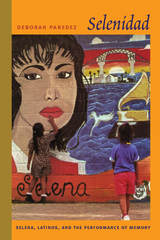 Selenidad: Selena, Latinos, and the Performance of Memory
Deborah Paredez
Duke University Press, 2009 An outpouring of memorial tributes and public expressions of grief followed the death of the Tejana recording artist Selena Quintanilla Pérez in 1995. The Latina superstar was remembered and mourned in documentaries, magazines, websites, monuments, biographies, murals, look-alike contests, musicals, drag shows, and more. Deborah Paredez explores the significance and broader meanings of this posthumous celebration of Selena, which she labels “Selenidad.” She considers the performer’s career and emergence as an icon within the political and cultural transformations in the United States during the 1990s, a decade that witnessed a “Latin explosion” in culture and commerce alongside a resurgence of anti-immigrant discourse and policy. Paredez argues that Selena’s death galvanized Latina/o efforts to publicly mourn collective tragedies (such as the murders of young women along the U.S.-Mexico border) and to envision a brighter future. At the same time, reactions to the star’s death catalyzed political jockeying for the Latino vote and corporate attempts to corner the Latino market. Foregrounding the role of performance in the politics of remembering, Paredez unravels the cultural, political, and economic dynamics at work in specific commemorations of Selena. She analyzes Selena’s final concert, the controversy surrounding the memorial erected in the star’s hometown of Corpus Christi, and the political climate that served as the backdrop to the touring musicals Selena Forever and Selena: A Musical Celebration of Life. Paredez considers what “becoming” Selena meant to the young Latinas who auditioned for the biopic Selena, released in 1997, and she surveys a range of Latina/o queer engagements with Selena, including Latina lesbian readings of the star’s death scene and queer Selena drag. Selenidad is a provocative exploration of how commemorations of Selena reflected and changed Latinidad.
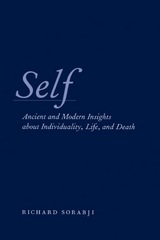 Self: Ancient and Modern Insights about Individuality, Life, and Death
Richard Sorabji
University of Chicago Press, 2006 Drawing on classical antiquity and Western and Eastern philosophy, Richard Sorabji tackles in Self the question of whether there is such a thing as the individual self or only a stream of consciousness. According to Sorabji, the self is not an undetectable soul or ego, but an embodied individual whose existence is plain to see. Unlike a mere stream of consciousness, it is something that owns not only a consciousness but also a body.
Sorabji traces historically the retreat from a positive idea of self and draws out the implications of these ideas of self on the concepts of life and death, asking: Should we fear death? How should our individuality affect the way we live? Through an astute reading of a huge array of traditions, he helps us come to terms with our uneasiness about the subject of self in an account that will be at the forefront of philosophical debates for years to come. “There has never been a book remotely like this one in its profusion of ancient references on ideas about human identity and selfhood . . . . Readers unfamiliar with the subject also need to know that Sorabji breaks new ground in giving special attention to philosophers such as Epictetus and other Stoics, Plotinus and later Neoplatonists, and the ancient commentators on Aristotle (on the last of whom he is the world's leading authority).”—Anthony A. Long, Times Literary Supplement
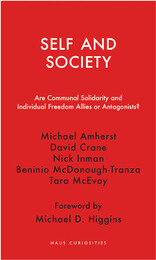 Self and Society: Are Communal Solidarity and Individual Freedom Allies or Antagonists?
Michael Amherst, David Crane, Nick Inman, Beninio McDonough-Tranza, and Tara McEvoy
Haus Publishing, 2021 A collection of five essays from the 2020 Hubert Butler Essay Prize that examine contemporary society, featuring a foreword from Irish President Michael D. Higgins.
Bringing together the winning and shortlisted essays from the 2020 Hubert Butler Essay Prize, Self and Society presents five fresh perspectives on the tension between individual freedom and communal solidarity, asking what we owe our communities and why it matters. With a foreword by Ireland’s President Michael D. Higgins, the book examines themes that are more pressing than ever in the age of Coronavirus and Brexit, invoking the spirit of the Irish essayist Hubert Butler to investigate whether collective and personal aims can be synergistic or are destined to remain ever in conflict.
Winner Michael Amherst takes on identity politics, questioning whether the stratification of society in the name of social justice is helpful or harmful in the pursuit of equality. Runners-up Tara McEvoy and David Crane tackle, respectively, the necessity of collective action as a response to the current pandemic and other social crises, and the role of conflicts of individual freedom in facilitating or stifling the economic liberation of refugees. Special mentions have been awarded to Nick Inman and Beninio McDonough-Tranza for their respective essays on personal responsibility and the legacy of the Polish union Solidarnosc.
 Self and Soul: A Defense of Ideals
Mark Edmundson
Harvard University Press, 2015 An ARTery Best Book of the Year
An Art of Manliness Best Book of the Year
In a culture that has become progressively more skeptical and materialistic, the desires of the individual self stand supreme, Mark Edmundson says. We spare little thought for the great ideals that once gave life meaning and worth. Self and Soul is an impassioned effort to defend the values of the Soul.
“An impassioned critique of Western society, a relentless assault on contemporary complacency, shallowness, competitiveness and self-regard…Throughout Self and Soul, Edmundson writes with a Thoreau-like incisiveness and fervor…[A] powerful, heartfelt book.”
—Michael Dirda, Washington Post
“[Edmundson’s] bold and ambitious new book is partly a demonstration of what a ‘real education’ in the humanities, inspired by the goal of ‘human transformation’ and devoted to taking writers seriously, might look like…[It] quietly sets out to challenge many educational pieties, most of the assumptions of recent literary studies—and his own chosen lifestyle.”
—Mathew Reisz, Times Higher Education
“Edmundson delivers a welcome championing of humanistic ways of thinking and living.”
—Kirkus Reviews
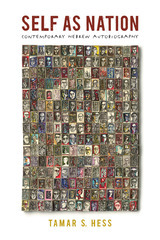 Self as Nation: Contemporary Hebrew Autobiography
Tamar S. Hess
Brandeis University Press, 2016 Theorists of autobiography tend to emphasize the centrality of the individual against the community. By contrast, in her reading of Hebrew autobiography, Tamar Hess identifies the textual presence and function of the collective and its interplay with the Israeli self. What characterizes the ten writers she examines is the idea of a national self, an individual whose life story takes on meaning from his or her relation to the collective history and ethos of the nation. Her second and related argument is that this self—individually and collectively—must be understood in the context of waves of immigration to Israel’s shores. Hess convincingly shows that autobiography is a transnational genre deeply influenced by the nation’s literary as well as cultural history. This book makes an additional contribution to the history of autobiography and contemporary autobiography theory by analyzing the strategies of fragmentation that many of the writers Hess studies have adopted as ways of dealing with the conflicts between the self and the nation, between who they feel they are and what they are expected to be. Hess contrasts the predominantly masculine tradition of Hebrew autobiography with writings by women, and offers a fresh understanding of the Israeli soul and the Hebrew literary canon. A systematic review of contemporary Hebrew autobiography, this study raises fundamental questions essential to the debates about identity at the heart of Israeli culture today. It will interest scholars and students of contemporary Israeli culture, as well as those intrigued by the literary genre of autobiography.
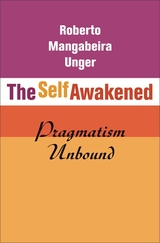 The Self Awakened: Pragmatism Unbound
Roberto Mangabeira Unger
Harvard University Press, 2009 In what kind of world and for what kind of thought is time real, history open, and novelty possible? In what kind of world and for what kind of thought does it make sense for a human being to look for trouble rather than to stay out of trouble?In this long-awaited work of general philosophy, Roberto Mangabeira Unger proposes a radical reorientation of established ideas about nature, mind, society, politics, and religion. He shows how we have to change our beliefs if we are to succeed in doing justice to our most distinctive contemporary experiences, discoveries, and ideals.
The Self Awakened mobilizes the resources of several philosophical traditions, and develops the unrecognized revolutionary implications of the most influential of these traditions today--pragmatism. Avoiding technical jargon and needless complication, this book makes a case for philosophy as the supreme activity of the intellect at war, insisting on its power to deal with what matters most.
The Self in Transition: Infancy to Childhood
Edited by Dante Cicchetti and Marjorie Beeghly
University of Chicago Press, 1990 Twenty-four distinguished behavioral scientists present recent research on the self during the pivotal period of transition from infancy to childhood and place it in historical perspective, citing earlier work of such figures as William James, George Herbert Mead, Sigmund Freud, and Heinz Kohut.
Contributors are Elizabeth Bates, Marjorie Beeghly, Barbara Belmont, Leslie Bottomly, Helen K. Buchsbaum, George Butterworth, Vicki Carlson, Dante Cicchetti, James P. Connell, Robert N. Emde, Jerome Kagan, Robert A. LeVine, Andrew N. Meltzoff, Editha Nottelmann, Sandra Pipp, Marian Radke-Yarrow, Catherine E. Snow, L. Alan Sroufe, Gerald Stechler, Sheree L. Toth, Malcolm Watson, and Dennie Palmer Wolf.
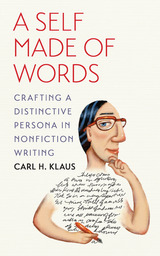 A Self Made of Words: Crafting a Distinctive Persona in Nonfiction Writing
Carl H. Klaus
University of Iowa Press, 2013 Confident or fretful, solemn or sassy, tough or tender, casual or formal: the self you project in writing—your persona—is the byproduct of numerous decisions you make about what to say and how to say it. Though any single word or phrase or sentence might make little difference within the scope of an entire essay or book, collectively they create an impression of who you are or seem to be—an impression that’s sure to influence how readers respond to your work. Thus it’s essential to take charge of how you come across on the page, to craft an appropriate persona for whatever you’re writing, whether it’s a personal essay, a blog, a technical report, a letter to the editor, or a memoir. In this wise and ingenious little guide, noted essayist Carl Klaus shows you how to adapt your self to the needs of such varied nonfiction, by varying his own persona to illustrate the distinctive effect produced by each aspect and element of writing.
Klaus divides his book into two parts: first, an introduction to the nature and function of a persona, then a survey of the most important elements of writing that contribute to the character of a persona, from point of view and organization to diction and sentence structure. Both parts contain exercises that will give you practice in developing a persona of your choice. Challenging and stimulating, each of his exercises focuses on a distinctly different aspect of composition and style, so as to help you develop the skills of a versatile and personable writer. By focusing on the most important ways of projecting your self in nonfiction prose, you can learn to craft a distinctive self in your writing.
Self to Self: Selected Essays: Second Edition
J. David Velleman
Michigan Publishing, 2020 Self to Self brings together essays on personal identity, autonomy, and moral emotions by the philosopher J. David Velleman. Although the essays were written independently, they are unified by an overarching thesis – that there is no single entity denoted by “the self ” – as well as by themes from Kantian ethics, psychoanalytic theory, social psychology, and Velleman’s work in the philosophy of action. Two of the essays were selected by the editors of Philosophers’ Annual as being among the ten best papers in their year of publication. Self to Self will be of interest to philosophers, psychologists, and others who theorize about the self.
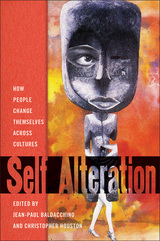 Self-Alteration: How People Change Themselves across Cultures
Jean-Paul Baldacchino
Rutgers University Press, 2024 Many of us feel a pressing desire to be different—to be other than who we are. Self-conscious, we anxiously perceive our shortcomings or insufficiencies, wondering why we are how we are and whether we might be different. Often, we wish to alter ourselves, to change our relationships, and to transform the person we are in those relationships. Not only a philosophical question about how other people change, self-alteration is also a practical care—can I change, and how? Self-Alteration: How People Change Themselves across Cultures explores and analyzes these apparently universal hopes and their related existential dilemmas. The essays here come at the subject of the self and its becoming through case studies of modes of transformation of the self. They do this with social processes and projects that reveal how the self acquires a non-trivial new meaning in and through its very process of alteration. By focusing on ways we are allowed to change ourselves, including through religious and spiritual traditions and innovations, embodied participation in therapeutic programs like psychoanalysis and gendered care services, and political activism or relationships with animals, the authors in this volume create a model for cross-cultural or global analysis of social-self change that leads to fresh ways of addressing the 'self' itself.
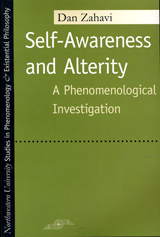 Self-Awareness and Alterity: A Phenomenological Investigation
Dan Zahavi
Northwestern University Press, 2015 Winner of the 2000 The Edward Goodwin Ballard Prize in Phenomenology
In the rigorous and highly original Self-Awareness and Alterity, Dan Zahavi provides a sustained argument that phenomenology, especially in its Husserlian version, can contribute something decisive to the analysis of self-awareness. Taking on recent discussions within both analytical philosophy (Shoemaker, Castaneda, Nagel) and contemporary German philosophy (Henrich, Frank, Tugendhat), Zahavi argues that the phenomenological tradition has much more to offer when it comes to the problem of self-awareness than is normally assumed. As a contribution to the current philosophical debate concerning self-awareness, the book presents a comprehensive reconstruction of Husserl's theory of pre-reflective self-awareness, thereby criticizing a number of prevalent interpretations and a systematic discussion of a number of phenomenological insights related to this issue, including analyses of the temporal, intentional, reflexive, bodily, and social nature of the self.
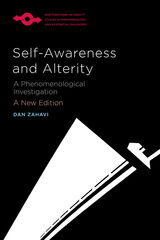 Self-Awareness and Alterity: A Phenomenological Investigation
Dan Zahavi
Northwestern University Press, 2020 In the rigorous and highly original Self-Awareness and Alterity, Dan Zahavi provides a sustained argument that phenomenology, especially in its Husserlian version, can make a decisive contribution to discussions of self-awareness. Engaging with debates within both analytic philosophy (Elizabeth Anscombe, John Perry, Sydney Shoemaker, Héctor-Neri Castañeda, David Rosenthal) and contemporary German philosophy (Dieter Henrich, Manfred Frank, Ernst Tugendhat), Zahavi argues that the phenomenological tradition has much more to offer when it comes to the problem of self-awareness than is normally assumed.
As a contribution to the current philosophical debate concerning self-awareness, the book presents a comprehensive reconstruction of Husserl’s theory of pre-reflective self-awareness, thereby criticizing a number of prevalent interpretations. In addition, Zahavi also offers a systematic discussion of a number of phenomenological insights related to the issue of self-awareness, including analyses of the temporal, intentional, reflexive, bodily, and social nature of the self.
The new edition of this prize-winning book has been updated and revised, and all quotations have been translated into English. It also contains a new preface in which Zahavi traces the developments of the debates around self-awareness over the last twenty years and situates this book in the context of his subsequent work.
Self-Build Homes: Social Discourse, Experiences and Directions
Edited by Michaela Benson and Iqbal Hamiduddin
University College London, 2017 This collection on the self-build home movement connects burgeoning research in the United Kingdom with commentary from international figures. Focusing on community, dwelling, and identity, the chapters engender new dialogues on self-building, calling for more recognition of the social dimensions of the process. By investigating the development of structures, the practices that shape them, and the experiences of the residents, these essays offer policy planners tangible perspective on the affordable housing crisis and one potential response.
 Self-Consciousness
Sebastian Rödl
Harvard University Press, 2007 The topic of this book is self-consciousness, which is a kind of knowledge, namely knowledge of oneself as oneself, or self-knowledge. Sebastian Rödl's thesis is that self-knowledge is not empirical; it does not spring from sensory affection. Rather, self-knowledge is knowledge from spontaneity; its object and its source are the subject's own activity, in the primary instance its acts of thinking, both theoretical and practical thinking, belief and action.
The chapters of this book cover action and belief, freedom and reason, receptive knowledge and the second person. Each of these topics deserves its own book. And yet they would all be books on self-consciousness, for self-consciousness is the principle of their respective subject matters. Contemporary theories have been badly served by failing to acknowledge this. Taking the full measure of this insight requires a major conceptual reorientation in action theory, the philosophy of mind, and epistemology, which is begun in this book. As it can be said to be the principal thought animating Kant and his Idealist successors that self-consciousness occupies this central position, the book can be read as an attempt to recover and rejuvenate the achievement of the German Idealist tradition.
|
|
